Once you’ve got a quality frame, a set of the best road bike wheels is arguably the best upgrade you can give your steed.
There are several factors to consider when choosing a road bike wheelset. But in short, they must offer smooth and dependable hubs, provide a consistent braking surface (if they’re for a rim brake bike), and ideally balance being lightweight and aerodynamically efficient.
Upgrading to a wheelset that hits these marks more accurately than what you’re currently riding can inject some serious new life into a road bike or gravel bike.
Improvements can include improved ride quality, faster average speeds or just a lower weight – something that helps with both acceleration and deceleration.
Furthermore, the switch to tubeless tyres and disc brakes has also shaken up the market substantially, with new designs pushing the boundaries of what was previously possible on road bikes.
Wider rims support wide road bike tyres and gravel tyres a lot better and improve aerodynamics by smoothing the interface between the tyre and the rim.
With so many options available, choosing a wheelset can be hard. Fortunately for you, our testers have reviewed many road bike wheelsets over the years and the wheels listed below are the cream of the crop.
This list contains disc brake-specific wheelsets and wheels for rim brake bikes. There are aero and climbing wheels across braking types as well as options for all budgets.
You can jump to the different types of wheels in this list, as well as our buyer’s guide, by hitting the links below:
Best road bike wheels in 2024
Best disc brake road bike wheels
Bontrager Aeolus Elite 50
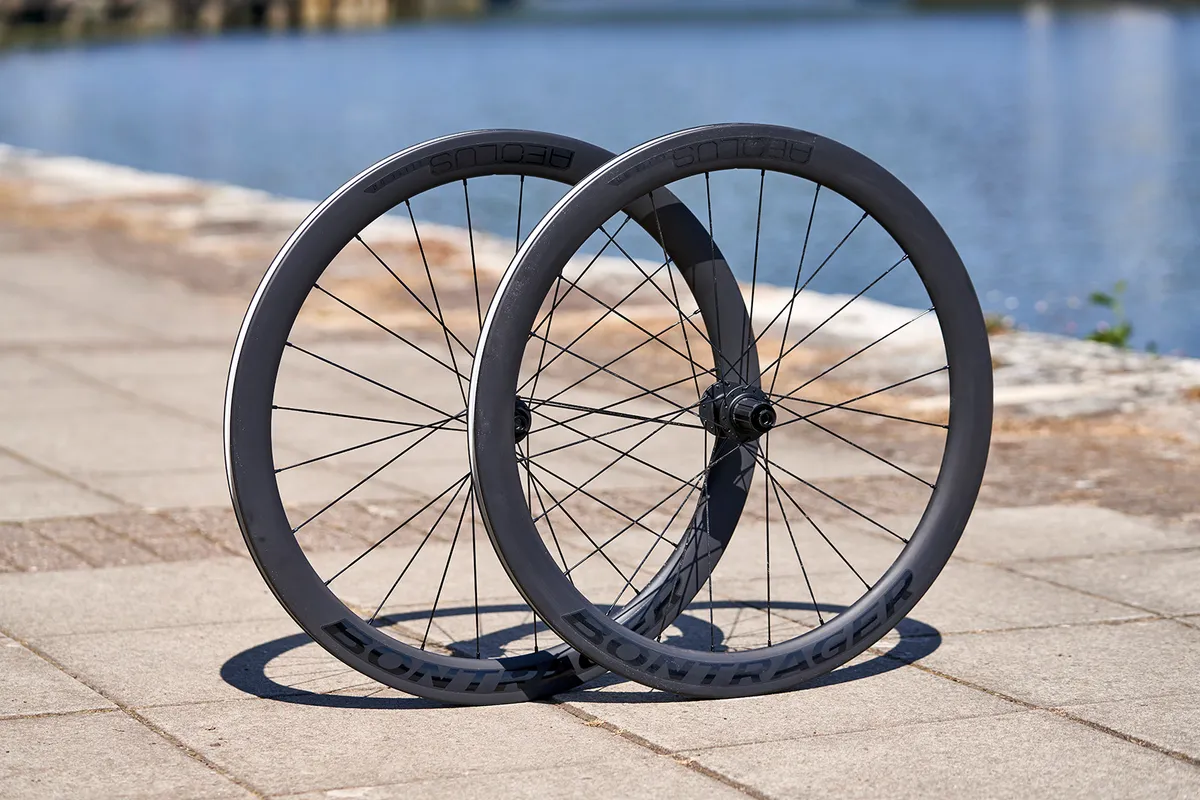
- £849 / €1,029 / $1,128 / AU$1,533 as tested
- Pros: Noticeably comfortable; high performance for a keen price
- Cons: 18 degrees of engagement in freehub isn't the fastest
The Bontrager Aeolus Elite 50 wheelset will appeal to riders who value performance across road racing, triathlon and even gravel racing.
The 50mm-deep rims are 28mm at their widest points with an internal width of 19.1mm. This shows the wheels are at the leading edge of aerodynamics and ensures the tyre will form part of the aero profile.
Despite the depth of the carbon rims, the wheelset has plenty of vertical compliance, making it comfortable to ride. This might lead you to think the wheelset would feel less than optimal when heading into turns, but in testing we found ourselves cornering with greater confidence.
The wheels were true out of the box and come with Bontrager’s TLR Rim Strip so you can set them up tubeless.
Zipp 303 Firecrest wheelset
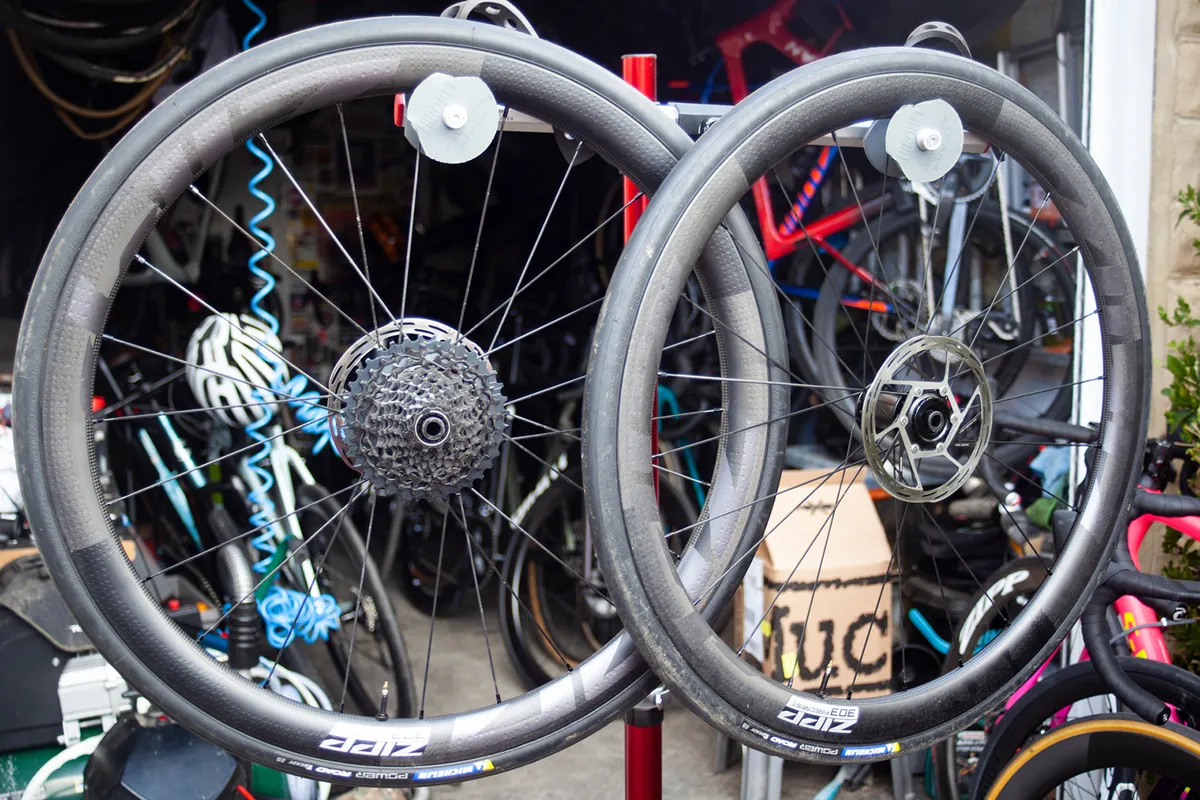
- £1,600 / €1,900 / $1,939 / AU$2,921 as tested
- Pros: Great ride quality; wide, fast and lightweight
- Cons: Stickers rather than decals
The 303 Firecrests are a premium choice for gravel and cyclocross as well as a good 40mm-deep option for road riding, with a 25mm internal hookless rim that’s easy to set up tubeless with just a track pump. This latest version weighs just 1,409g with valves, tape and disc brake rotor lockrings.
We really rated the ride quality, which is firm without flex, and the 66 engagement points on the freehub. Zipp’s price has come down too and you now get a lifetime warranty, while Zipp publishes a list of tyres it’s tested for compatibility.
DT Swiss ERC 1100 DiCut 45
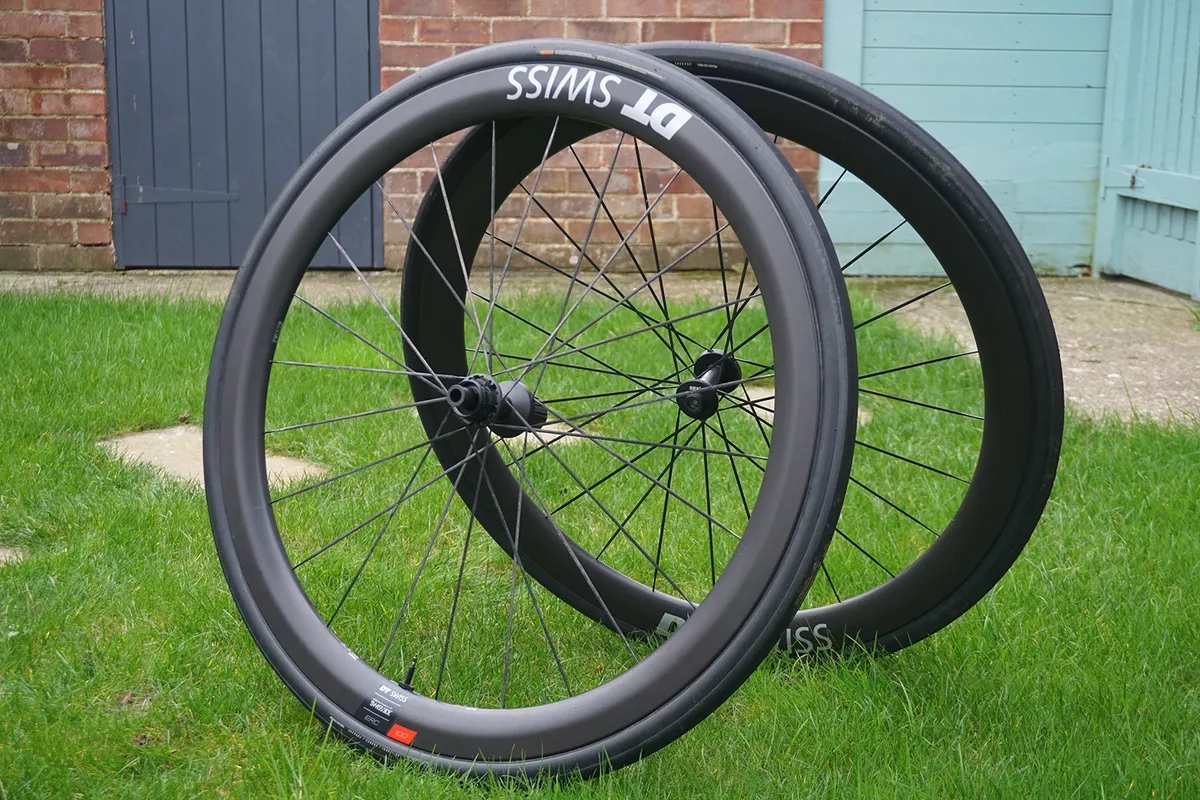
- £2,300 / €2,387.80 / $3,239.80 / AU$3,999 as tested
- Pros: High build quality; versatile design
- Cons: 1400 version of the wheelset offers better value
DT Swiss updated its ERC wheels in 2022 and this version tops the new range.
The wheels are suitable for riding on rough roads and light gravel and can be set up tubeless.
The carbon rim is significantly wider than the previous version, internally and externally. DT Swiss says the wheels are more stable in crosswinds than before and, anecdotally, they feel faster than other wheels in this depth.
The wheels have a high build quality. They are accurately machined and the bearings are well sealed but easily serviceable.
DT Swiss specs the wheels with hybrid ceramic bearings, meaning ceramic balls in metal races. These are claimed to improve performance but some will question whether they are worth it.
These ERC 1100 wheels are £500 more than the ERC 1400 wheels, with the main difference being the ceramic bearings. So if the advantages of these bearings are equivocal we reckon most riders will be just as having with the marginally heavier 1400s.
ENVE SES 4.5
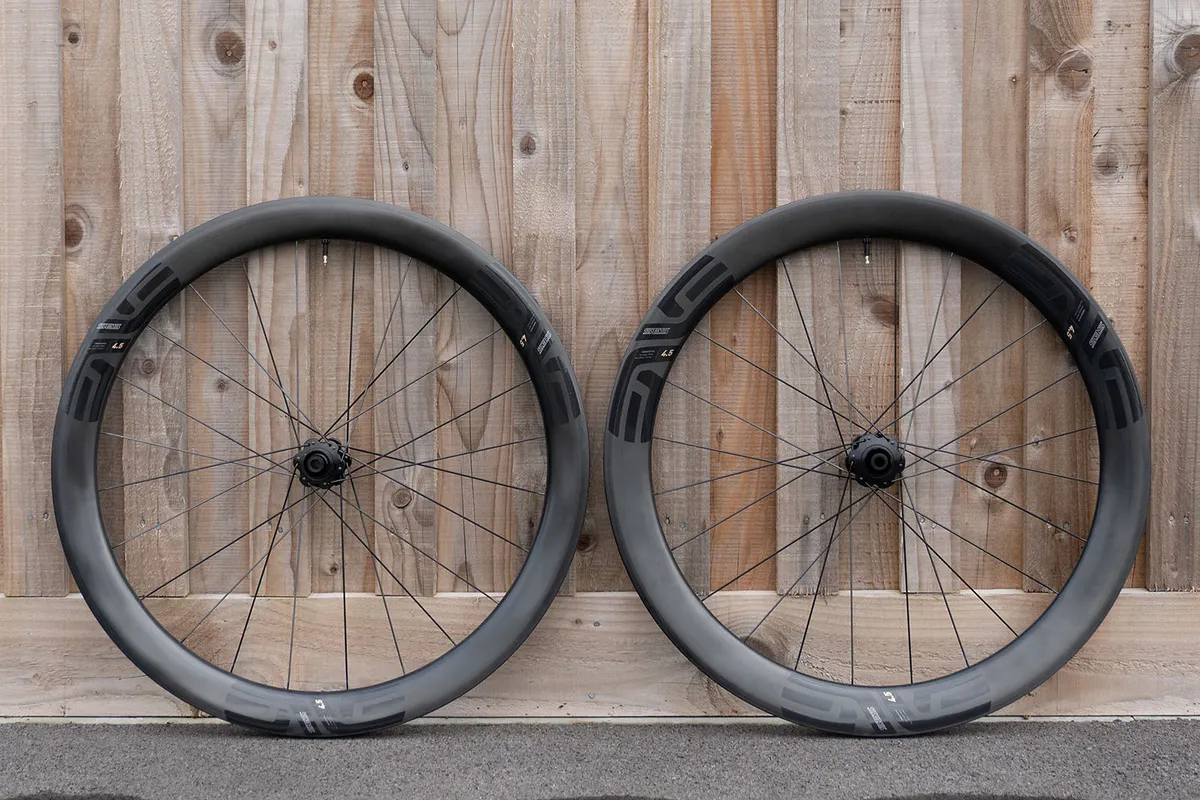
- £3,350 as tested
- Pros: Progressive rim designs; outstanding ride quality
- Cons: Massive price tag
The ENVE SES 4.5 is aimed at achieving 'real-world speed' and our tester found the wheelset to be quite possibly the best-performing mid-depth carbon wheelset they had ever tested.
The wheelset feels smooth and efficient. The wide rims make riding over less-than-perfect tarmac easy and consequently quicker. They also inspired confidence on descents because they help create a wider contact patch between your tyre and the ground.
The rim profile seems almost impervious to crosswinds – even with the 55mm-deep rear wheel and 49mm-deep front wheel. The rear hub with its 40t ratchet system engages quickly, which pays dividends on climbs.
Overall, the wheels are incredibly easy to ride. Unfortunately, they come at an eye-watering price.
HED Ardennes RA Pro
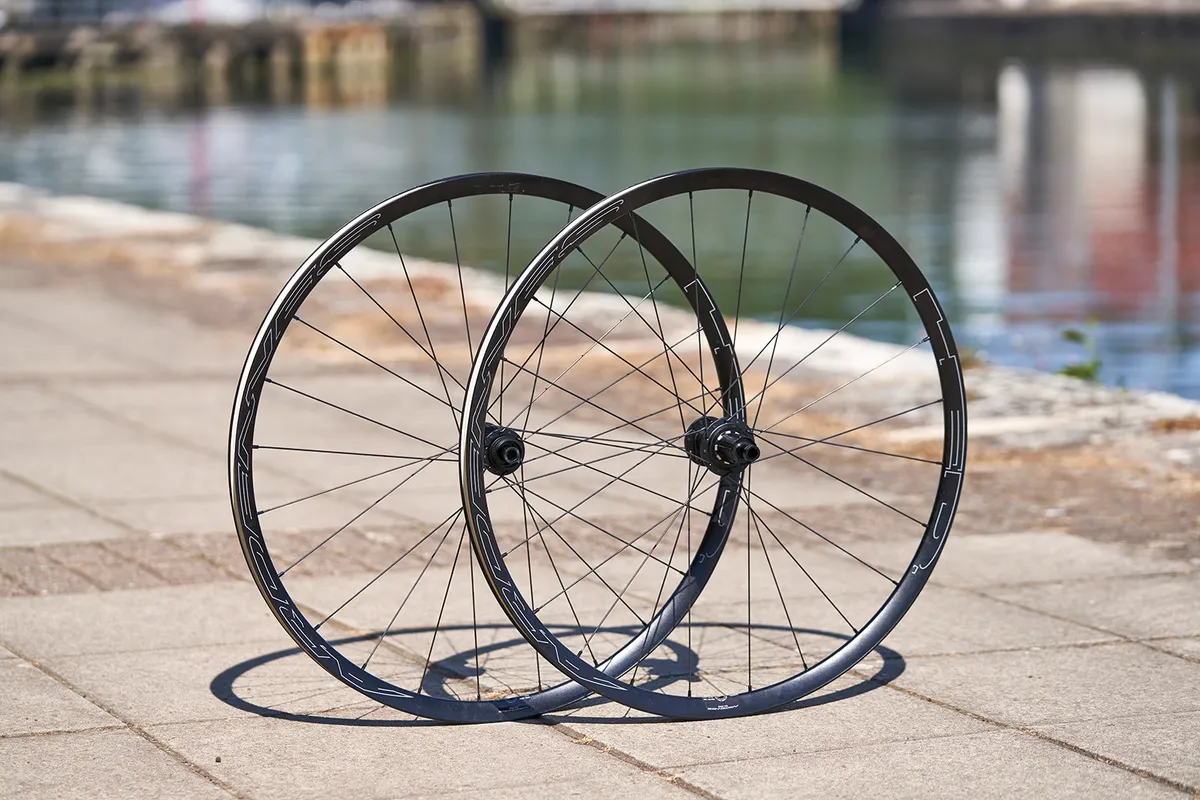
- £666 / €792 / $900 / AU$1,239 as tested
- Pros: Versatile alloy wheelset; suitable for ‘all-road’ riding
- Cons: Shallow internal rim depth can make fitting tyres tricky
The HED Ardennes RA Pro is a high-value alloy wheelset, suitable for less-than-perfect tarmac, cyclocross and all-road riding.
The wheelset uses HED’s own hubs. These are easy to service if you’re so inclined, and the rear hub offers positive engagement, accelerating almost intuitively.
The alloy rims mean these wheels aren’t as stiff as carbon wheelsets but they do have a sharper feeling than other alloy wheels we’ve tested recently.
The slight flex in the rim pays dividends on rougher terrain and fast descents: you are able to take on bumps with greater confidence than with rigid carbon wheels. Rapid direction changes feel smooth and composed.
Hunt Aero Wide 34 SL
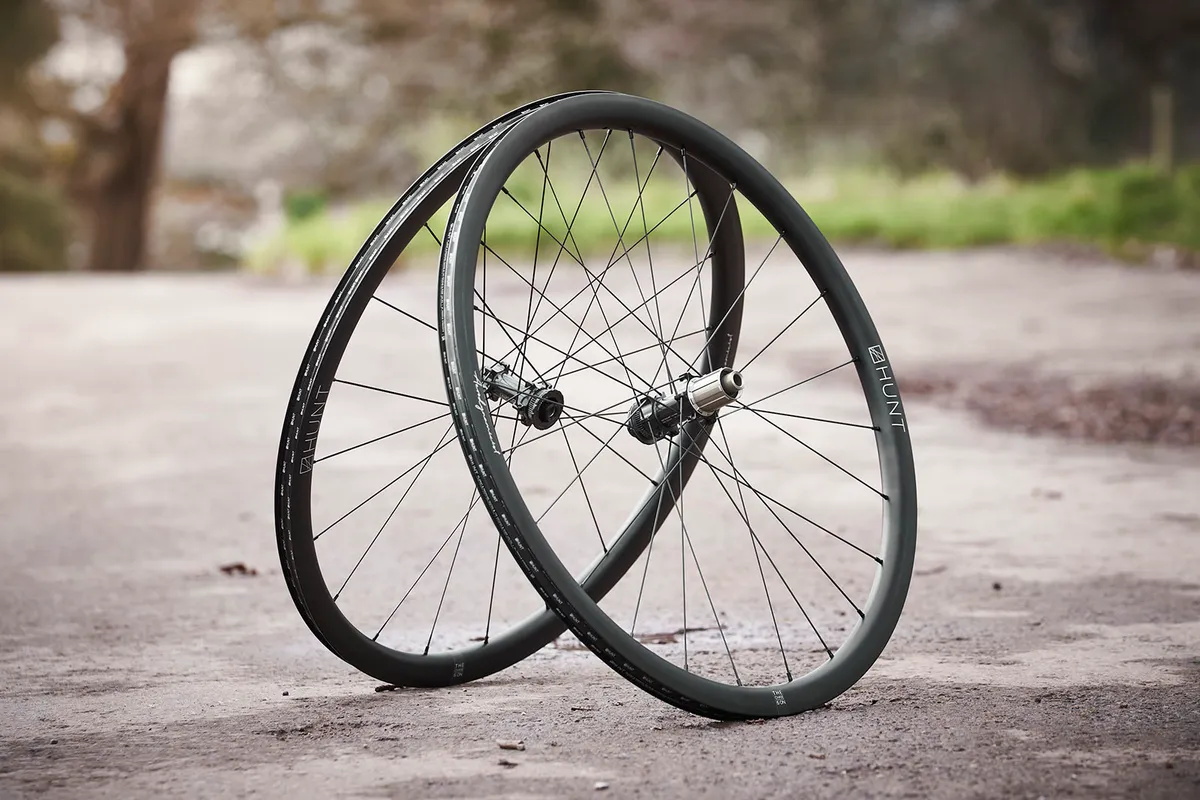
- £549 / $699 / €649 as tested
- Pros: Light, responsive feel; up-to-date rim design
- Cons: Noisy freehub
The Hunt Aero Wide 34 SL is one of the market's best-value, mid-priced alloy wheelsets.
Our tester was impressed with the wheelset’s speed on flat terrain, with the 34mm-deep rims feeling easy to hold at speeds above 30kph.
The wheelset also feels reactive and taut, leading to satisfying climbing, despite the wheels being a tad heavier than others.
Our tester also found the wheelset easy to set up tubeless. The wheels come with rim tape installed and tubeless valves are included.
Hunt has a reputation for loud freehubs. Despite using Hunt’s latest and quieter design, the Aero Wide 34 SL’s freehub is still noisy.
Hunt 54 Aerodynamicist Carbon Disc
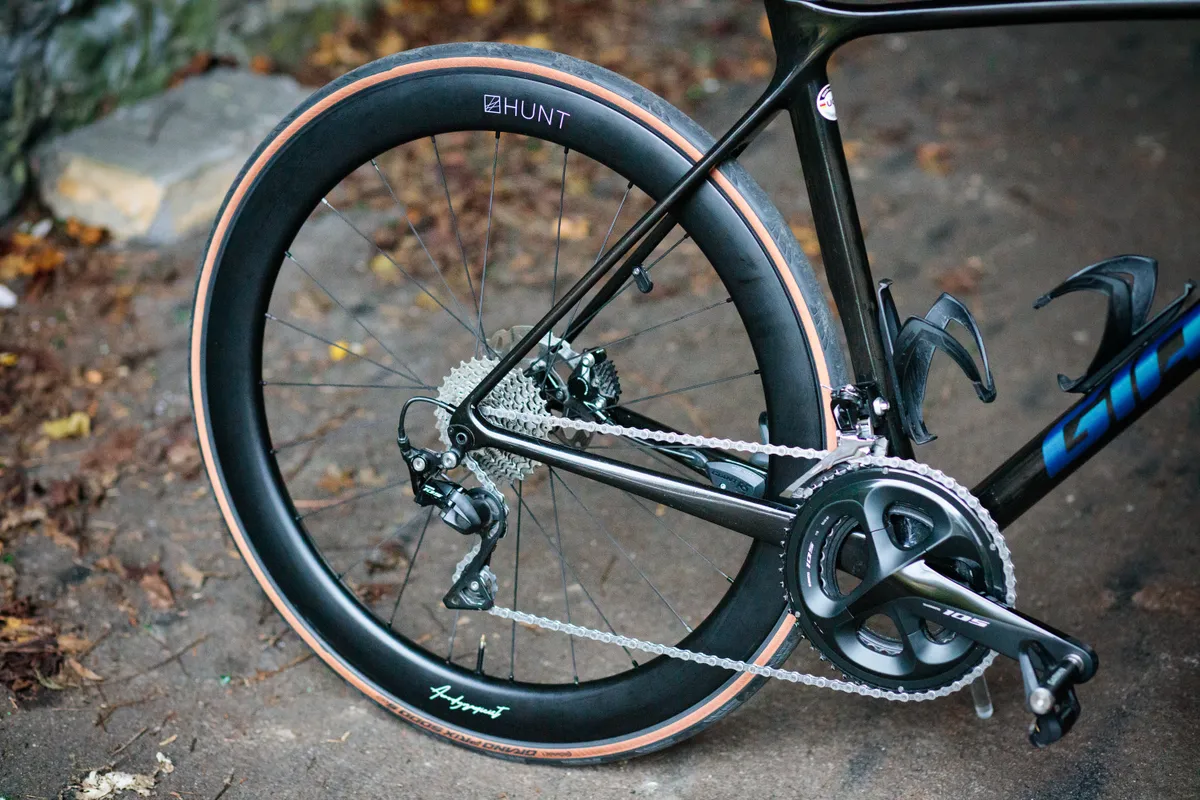
- £869 as tested
- Pros: Great-value; easy tubeless setup
- Cons: Deep rims require greater concentration in wind
The Hunt 54 Aerodynamicist Carbon Disc wheelset offers looks with performance to match at a competitive price and weight.
The carbon wheels can be set up with clincher or tubeless road bike tyres and we found this to be hassle-free in testing. The rims have hooks, meaning you can use pretty much any tyre – even gravel tyres up to 50mm, according to the brand.
The wheelset feels fast and responsive out on the road. Hunt’s own-brand hubs are fairly loud, but the noise does seem to have been toned down compared to the brand’s older wheels.
At 54mm deep, you do have to be a bit more careful on windy days, should a gust catch your front wheel. However, we didn’t experience any problems with handling.
The wheels are covered by Hunt’s 60-day return policy and a free lifetime crash replacement policy for the original owner.
Reynolds ATRx
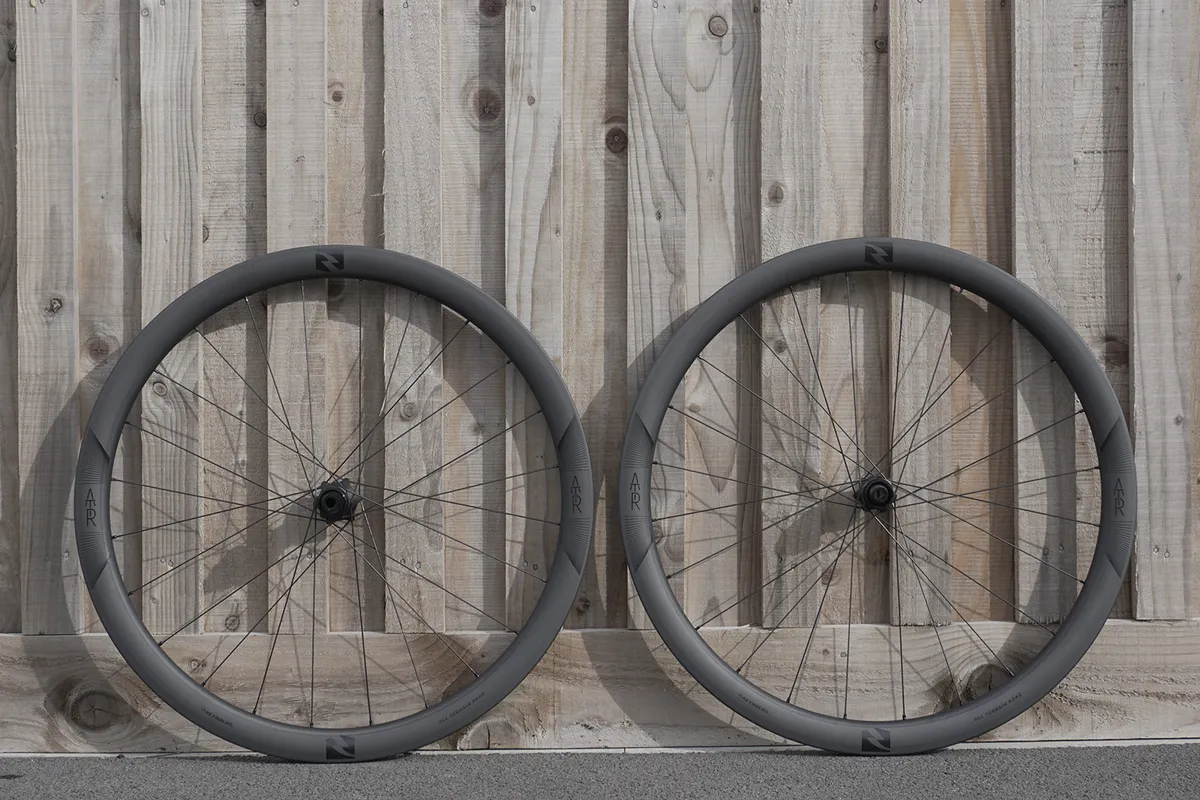
- £1,500 / $1,699 / €1,710 as tested
- Pros: Smooth all-road wheels; high-quality construction
- Cons: Not wide enough for some gravel tyres
The Reynolds ATRx all-road wheelset offers a smooth ride, excellent handling and high-quality construction.
The wheelset sits in the middle of Reynolds’ range, with upgraded spokes and hubs over the ATR wheelset. It has 40mm-deep hooked rims.
While there are faster and lighter rims available, the ATRx is competitive and composed across different types of riding. It’s impressive when subjected to hard climbing and riding fast along the flat, with the rear hub’s 10-degree engagement angle providing sharp pickup.
The ATRx can be used for gravel riding as well as road, but the 23mm internal rim width limits the size of gravel bike tyre you’ll be able to fit.
Roval Alpinist CLX II
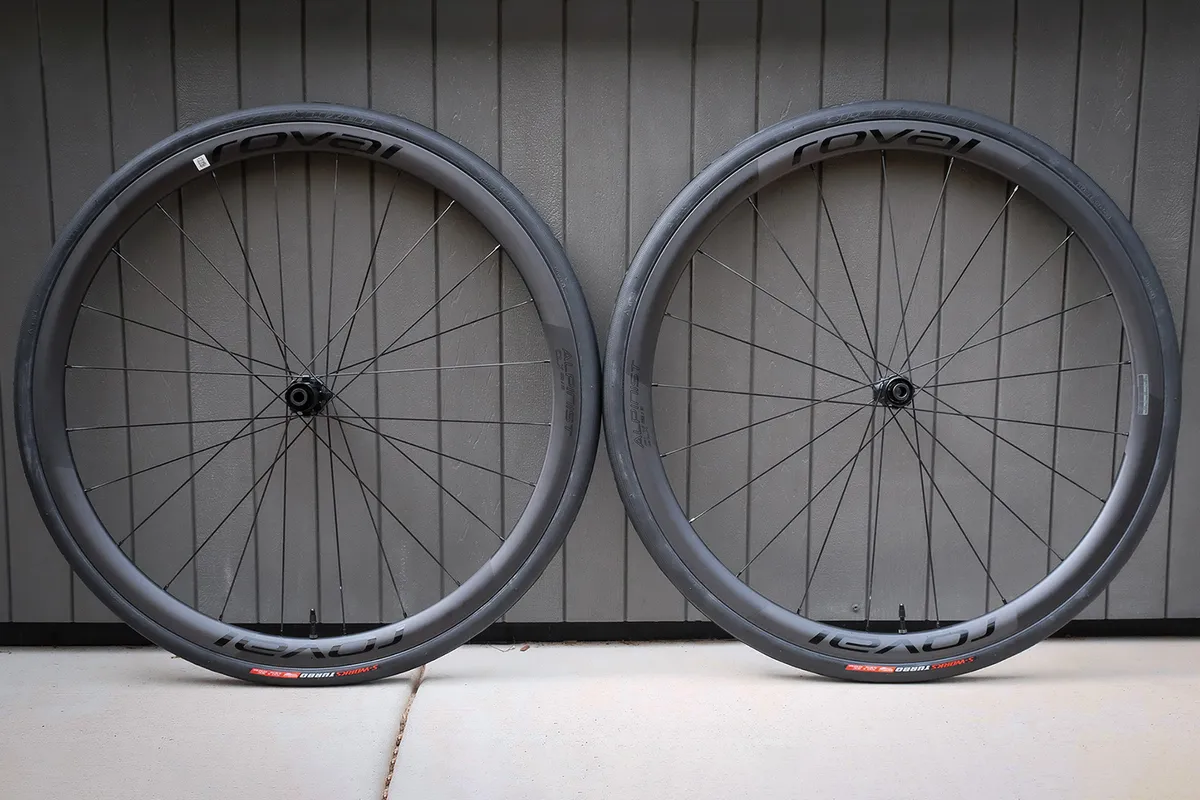
- £2,500 / $2,650 / €2,500 / AU$4,400 as tested
- Pros: Low weight; quality hub internals; great ride quality on rough roads
- Cons: Steep price tag
Now tubeless-compatible, the Roval Alpiniste CLX II wheelset weighs just 1,265g including tape and valves. Roval has shed weight from the original Alpiniste wheels with modifications to the hub, while reinforcing the 21mm internal width rims. These remain hooked for broad tyre compatibility and can be run tubed as well as tubeless.
As well as the low weight, we were impressed with the ride quality of the Alpiniste wheels on rough Colorado roads. At 32mm deep, they're not designed to be aero though. There's only a two year crash replacement warranty, which lags behind other expensive wheel brands.
Roval Rapide CLX II
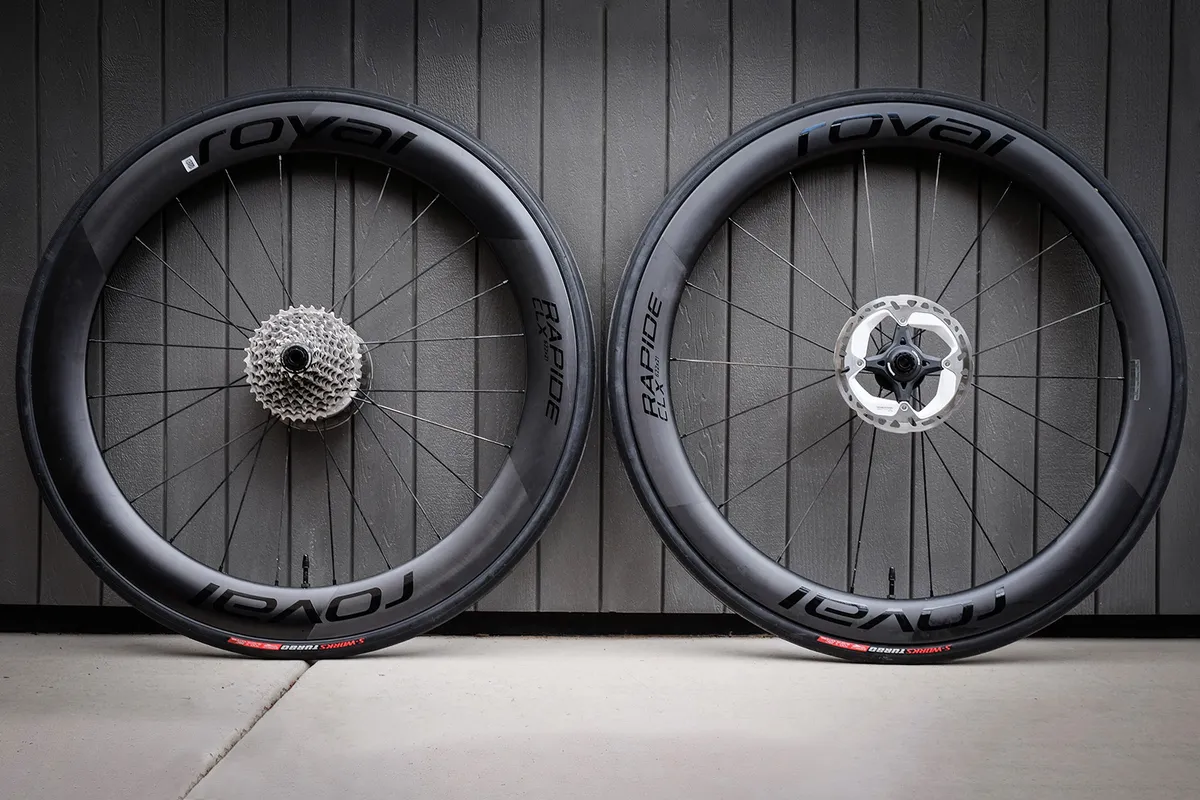
- £2,500 / $2,800 / €2,500 as tested
- Pros: Compliant ride; stable and fast
- Cons: High price
The Roval Rapide CLX II is a speedy aero disc-brake wheelset that now works with tubeless tyres.
Hooked rims mean the Roval Rapide CLX II can accommodate a wider selection of tyres than its hookless rivals.
The wheelset has a low weight of 1,520g including tubeless valves and tape.
Despite the aerodynamic profile – the rear wheel rim is 60mm deep and the front is 9mm shallower – the Roval Rapide CLX II is among the most composed of its class in blustery conditions.
Pace and poise come with comfort, making the wheelset suitable for longer road rides, as well as racing and fast training.
Zipp 404 Firecrest Tubeless Disc
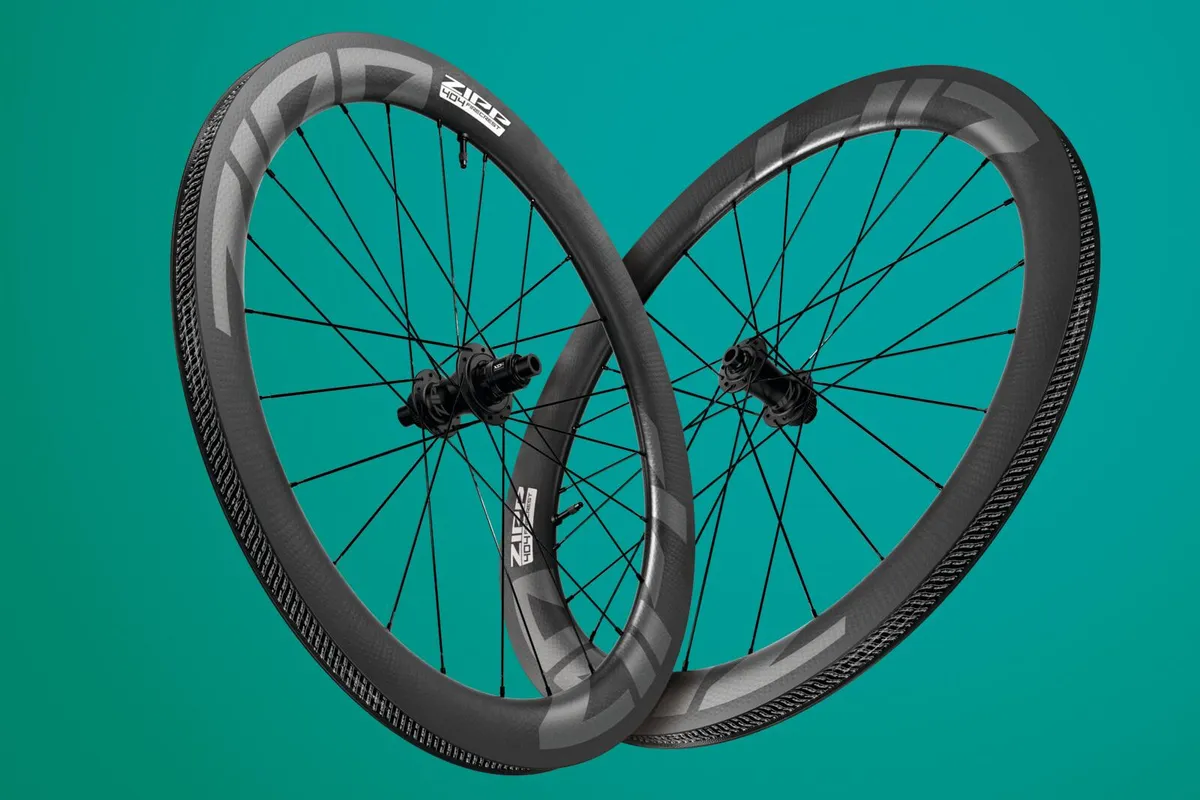
- £1,600 / $2,005 / €1,899 as tested
- Pros: Light, aero and stable for the depth
- Cons: Hookless rims may limit tubeless tyre choice
The Zipp 404 Firecrest wheelset is a superb wheelset for fast road cycling, offering low weight and a great ride feel that belies the 58mm-deep rims.
The deep rims mean the wheelset is tangibly fast on the flat while still being controllable in blustery conditions. Weighing 1,527g on our scales, these deep-section wheels aren’t a disadvantage on climbs.
The 404s have a hookless rim with an internal width of 23mm. The hookless rim can make finding compatible tubeless tyres difficult. But find a tyre that fits and the wide rim combined with the low pressures you can run with a tubeless setup means this version of the 404 is much more comfortable than its predecessor.
These wheels are ideal for road purists looking for speed, but if you want something a bit more versatile you might want to consider the shallower Zipp 303 Firecrest wheelset.
Boyd Prologue Series 44mm
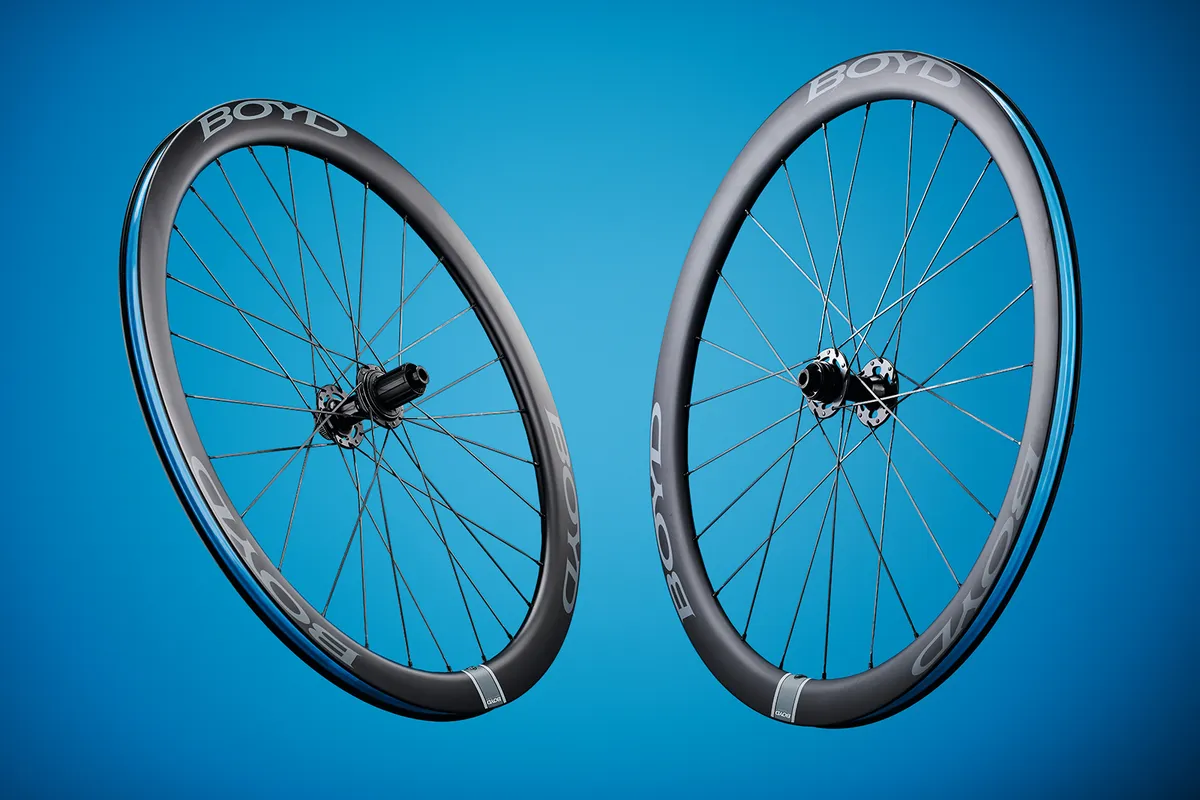
- £762 / $1,050 / €905 as tested
- Pros: Well priced; comfortable ride that’s not over-stiff
- Cons: Heavier than some of its rivals
Available for either disc or rim brakes, the Prologue wheels are 44mm deep with a 27mm external/19mm internal rim with the same profile as the brand’s premium Podium wheels. There’s a 28mm-deep disc brake version available too.
They’re tubeless-ready and laced with J-bend spokes to hubs with a 10-degree engagement freehub.
At 1,745g, they’re not light but feel more lively than that, with enough give to be comfortable without dulling the ride.
Cannondale HollowGram R45
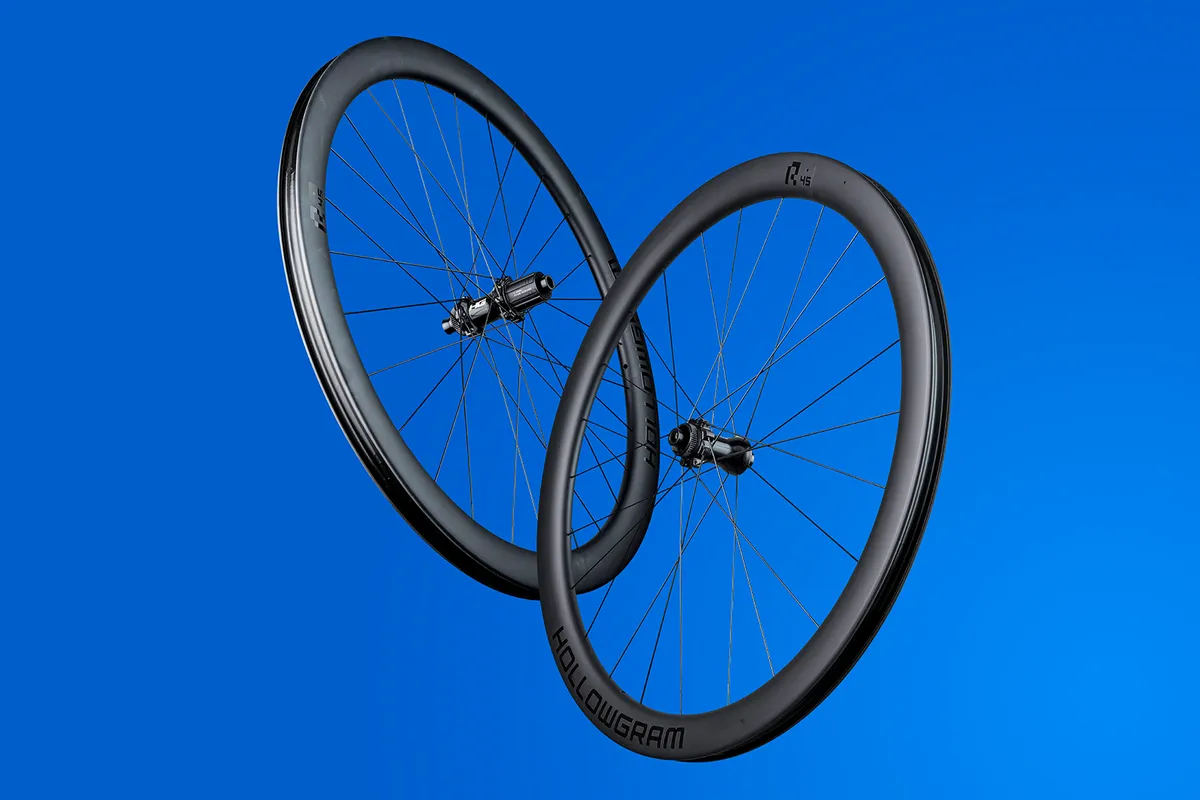
- £899 as tested
- Pros: High-quality carbon rims
- Cons: Overall mass may be a concern
The Cannondale HollowGRam R45 is an excellent carbon wheelset that defies its price tag.
The wheelset shares its tubeless carbon rim with Cannondale's pricier KNOT 45 SL wheelset – just with more spoke holes.
While the wheelset might be just over 200g heavier than the KNOT 45 SL, it gains speed with ease thanks in part to the 21 points of engagement in the rear hub. Our tester found them to be quicker than expected when coasting.
A 28mm tyre was easy to coax onto the rim and measured 30mm wide when inflated.
undefined
DT Swiss AR1600 Spline
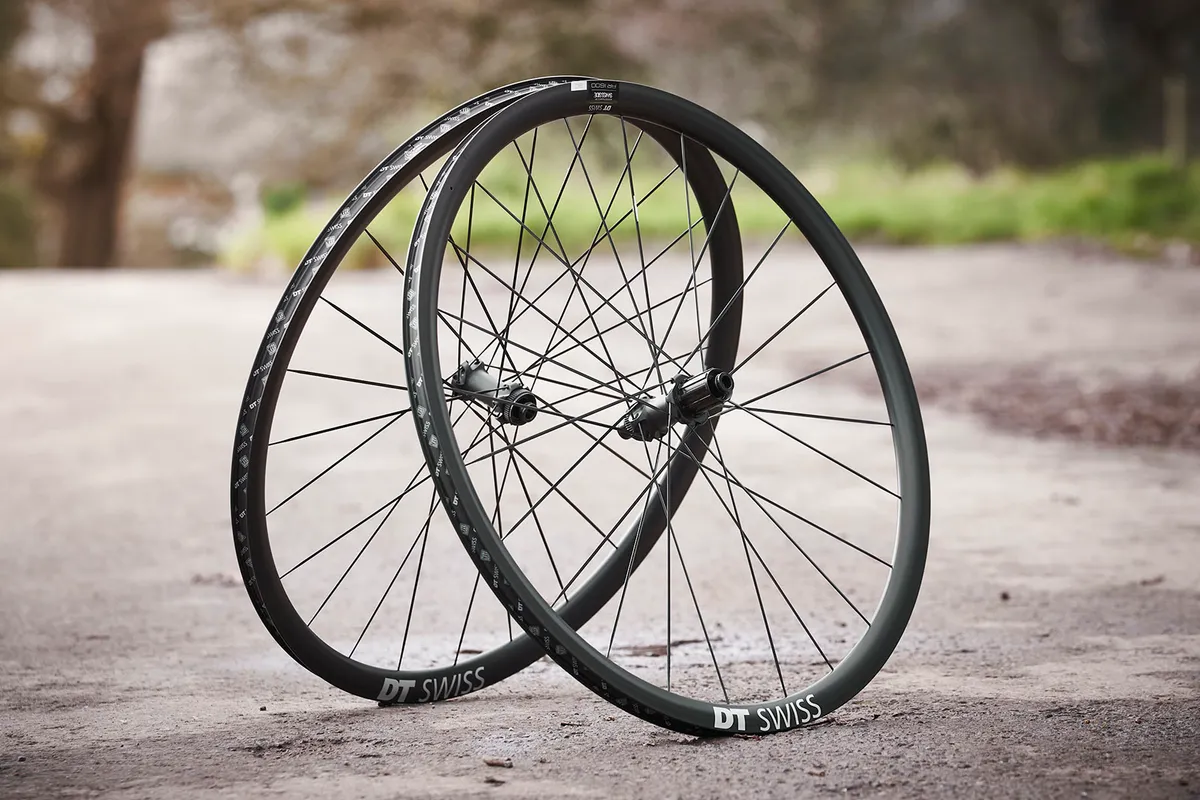
- £570 / $758 / €599 as tested
- Pros: Good all-round performance; highly regarded hubs
- Cons: Pricier than some impressive rivals
The DT Swiss AR1600 Spline is a straightforward but highly competent alloy wheelset.
It’s the highest-spec alloy wheelset in the manufacturer’s range, featuring the reputed DT Swiss 350 hubs and its AERO rim shape.
On the road, our tester found the wheels feel like an upgrade in terms of aerodynamic performance compared to non-optimised wheelsets. But the wheels still felt slower than the Hunt Aero Wide 34 SL on the flat, even if they did accelerate quickly.
Where these wheels shine is on rougher surfaces, smoothing out any lumps and bumps.
These all-rounders are a safe, reliable choice, which may justify the slightly higher price in the eyes of some.
ENVE 65
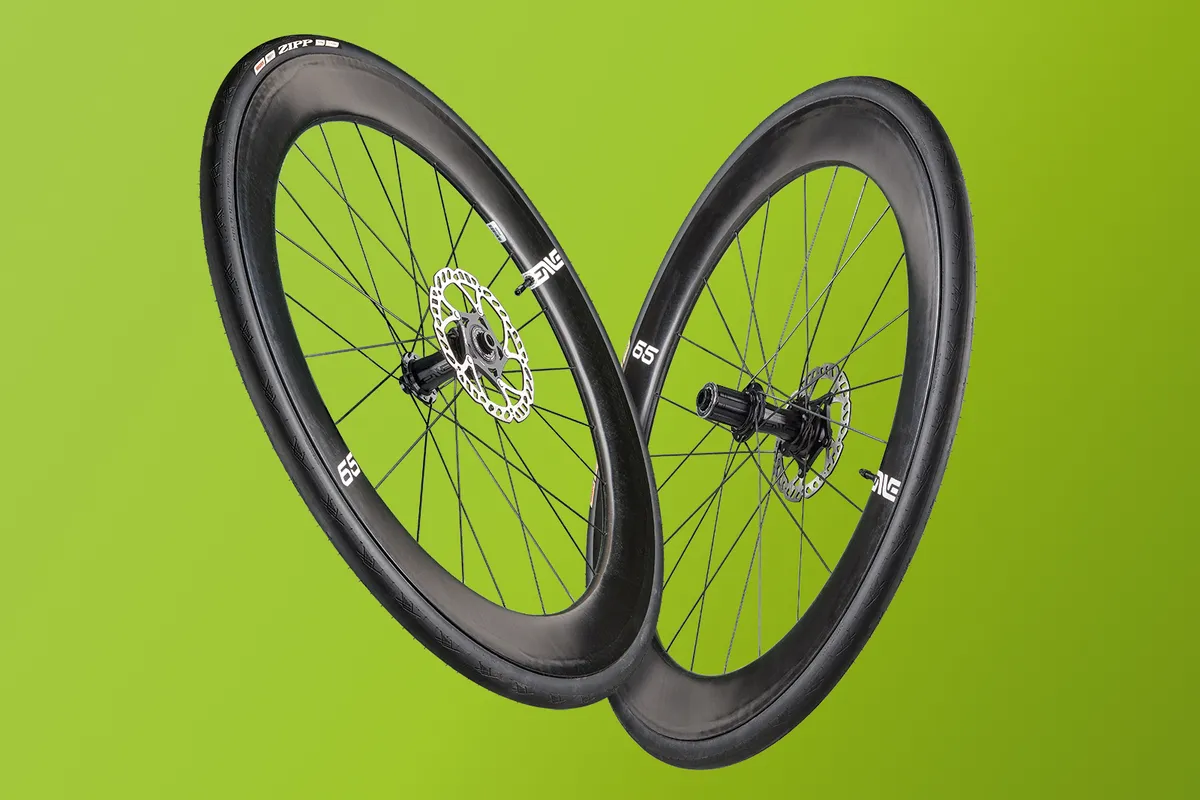
- £1,850 / $1,600 as tested
- Pros: ENVE quality at a (slightly) more affordable price; light and fast
- Cons: Can be slow to accelerate
ENVE's 65mm-deep wheelset offers you the prestige brand at a (relatively) lower price than its SES wheels. Unlike the SES wheels, the ENVE 65s' 21mm internal/28mm external width rims are identical front to rear. They’re tubeless-ready with hookless beads.
The ENVE 65 wheels weighed 1,640g, which is only 160g heavier than the SES wheels and the hub internals are the same, just with steel bearings in place of ceramic ones. We reckoned that was a fair trade-off for the £1,500 saving.
The wheels are really fast on still days, holding their speed well, although the depth makes acceleration slightly slower than shallower wheels. There was some buffeting once the wind got up, but ride comfort is good, particularly for such deep wheels.
Ere Research Explorator GCR40
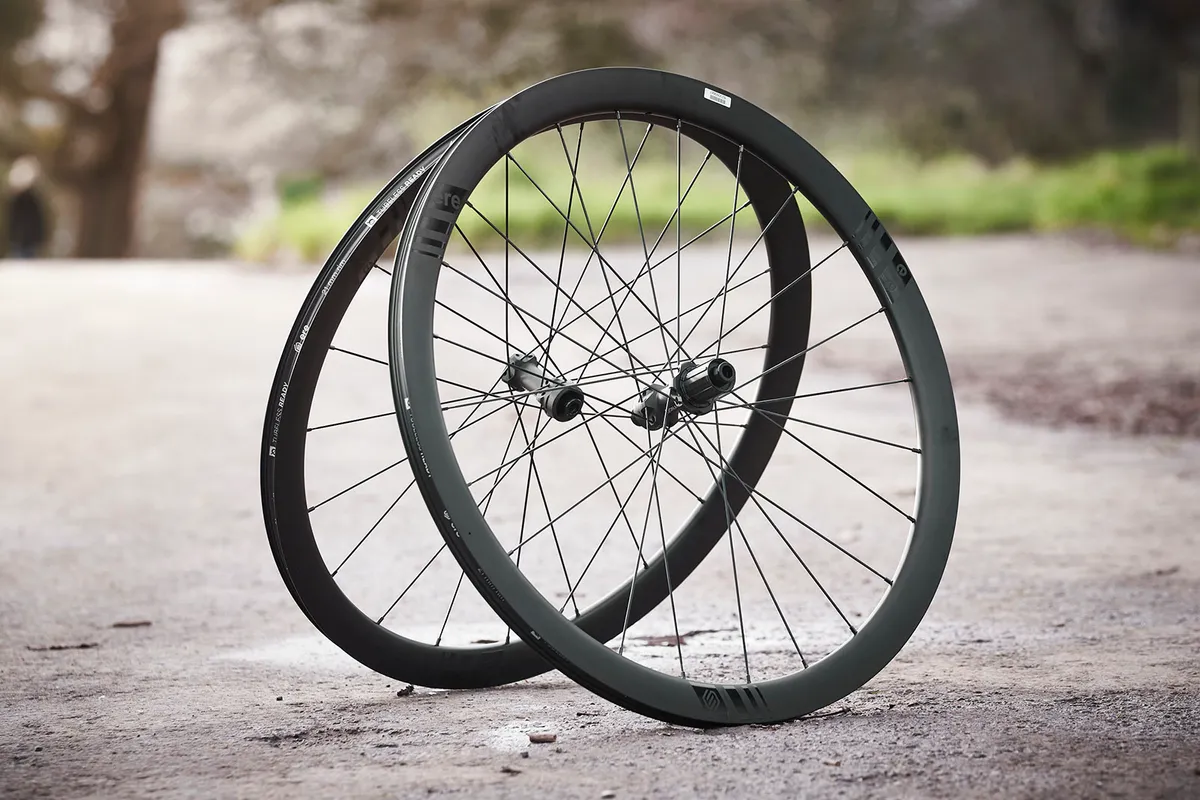
- £499 as tested
- Pros: Fast on the flat; composed on rougher terrain
- Cons: Heavy and sluggish on steep climbs
The Ere Research Explorator GCR40 wheelset proves aero performance doesn’t have to mean carbon fibre.
The alloy wheels, with their 40mm-deep rims, are fast on the flat and respond well to high speeds, feeling sharper when you put the hammer down.
The flipside to this is Ere’s wheelset is weightier than others and you can feel this on steeper climbs.
The wide internal rim width contributed to a composed ride feel and means the wheelset can fit 40mm-wide tyres, which is verging into gravel bike territory.
While the wheels may not be the best all-rounders, these are a good choice if you’re more concerned by speed than weight.
Hunt 48 Limitless UD Carbon Spoke Disc
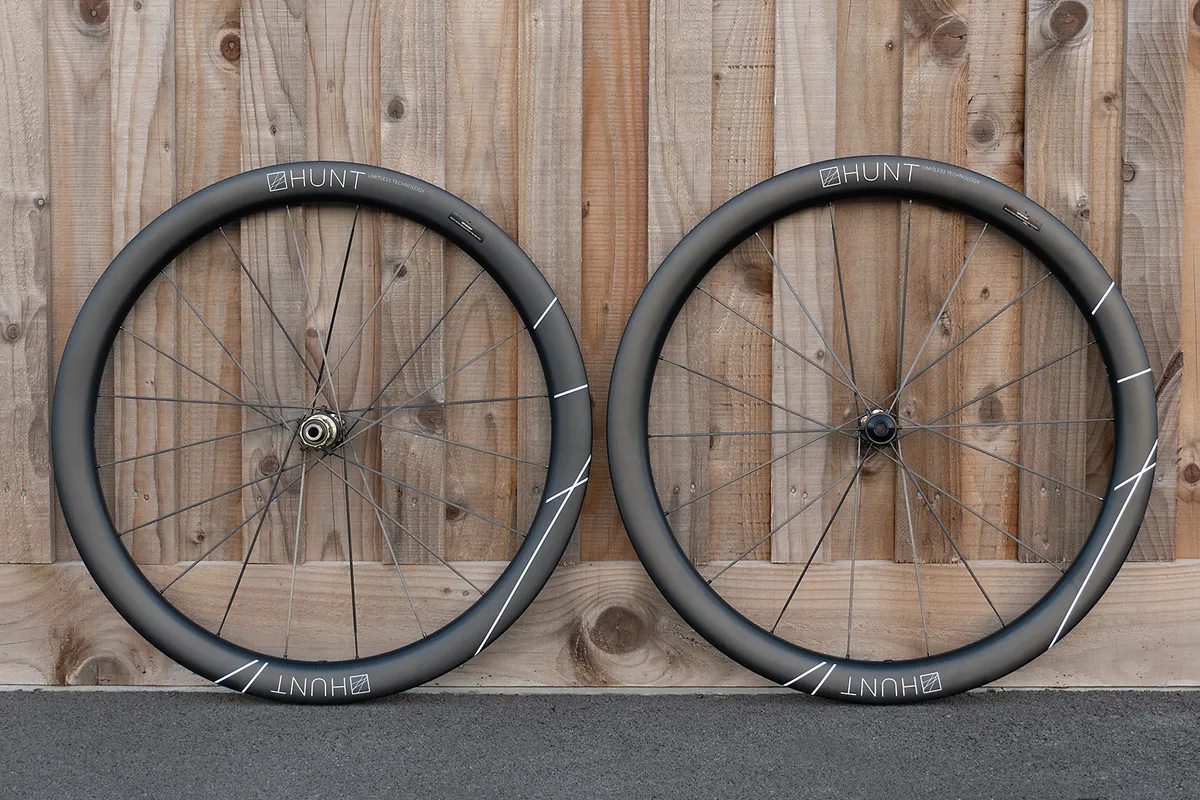
- £1,449 / $1,669 / €1,889 as tested
- Pros: Fast and very stiff
- Cons: Spoke adjustment ideally handled by Hunt
The 48 Limitless UD Carbon Spoke Disc is Hunt’s top-of-the-range aero wheelset, with the brand’s latest Aerodynamicist rim profile and carbon spokes for good measure.
The wheelset is available with either 48mm or 60mm-deep rims. We tested the 48mm version, which proved wickedly fast and tipped the scales at 1,548g. The wheelset performed impressively in crosswinds and blowy conditions, meaning you don’t have to be too attentive to weather conditions.
The wide internal rim maximises the nominal tyre size, and this improved descending and reduced road buzz.
The carbon spokes help save weight and provide loads of lateral stiffness, which makes these wheels good for climbing, despite their depth. However, Hunt says it's best to return the wheels for truing.
Hunt 60 Limitless Aero Disc
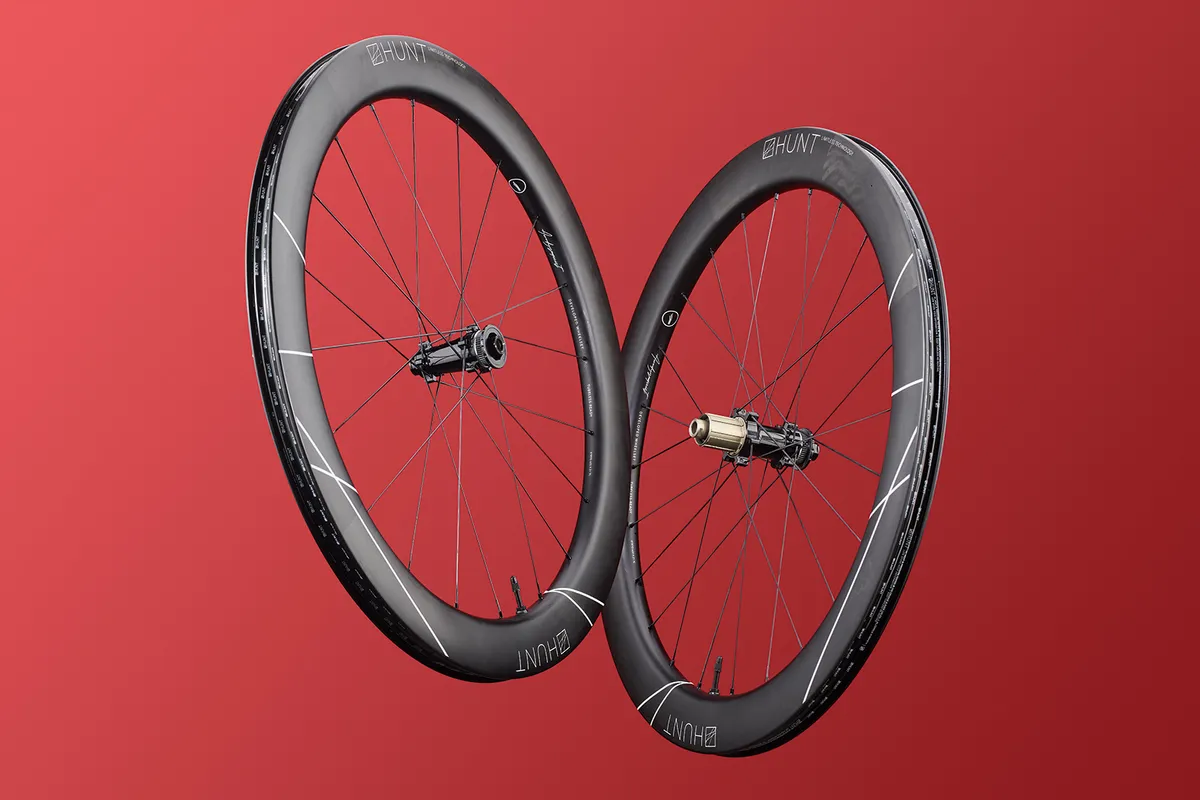
- £1,189 / $1,689 / €1,539 as tested
- Pros: Very fast on undulating roads
- Cons: noisy freehub
Hunt has wind-tunnel tested its 60mm-deep (which we tested) and 48mm-deep wheelsets against its competitors and says it equals or betters their performance.
Hunt uses special non-structural inserts to keep the weight down to 1,770g with tape, valves and lockring. There’s the option to upgrade to CeramicSpeed bearings.
They feel super-fast and come with a 7.5-degree engagement freehub for fast pick-up and noisy freewheeling. We loved the build quality and taut, responsive handling, although they are a bit twitchy in stronger crosswinds. Value is impressive too.
Hunt Alloy SL Disc
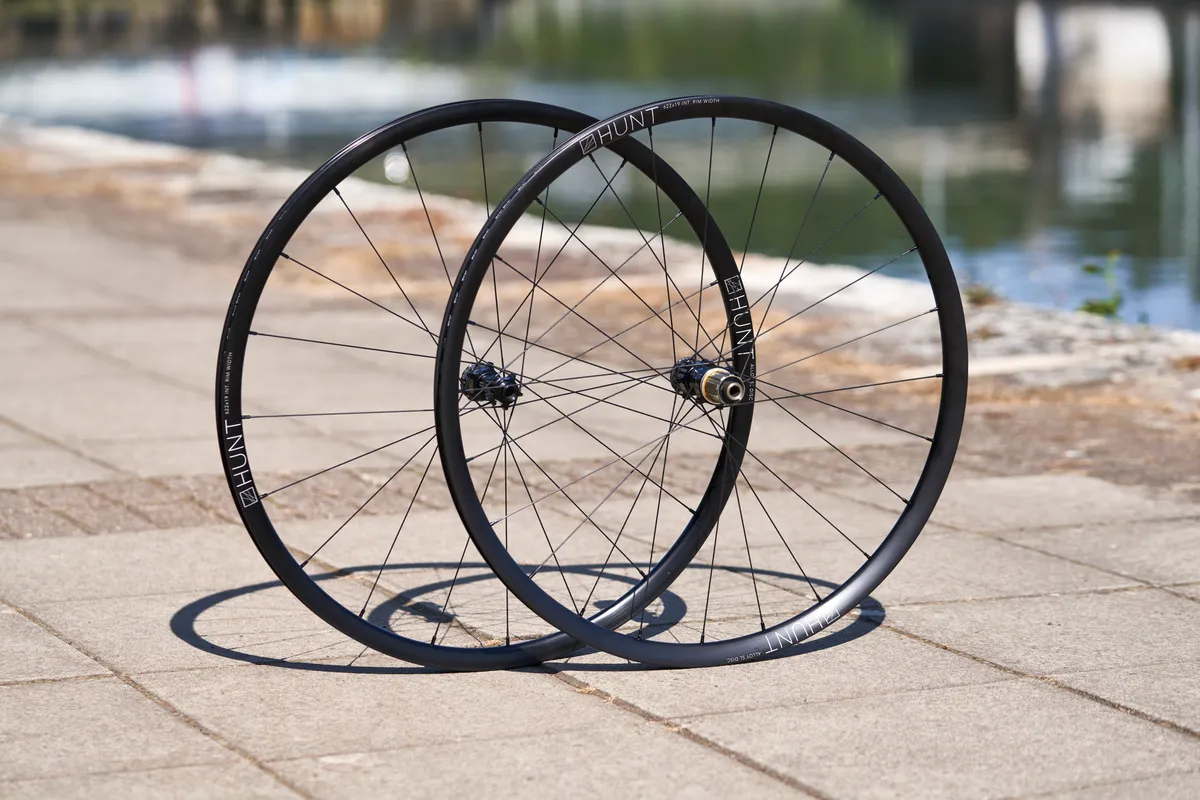
- £429 / €559 / $549 as tested
- Pros: Low 1,410g weight at a bargain price; snappy handling for alloy wheels
- Cons: Rear wheel was slightly out of true from box
Hunt's alloy wheelset is budget-priced, but still manages a competitive 1,410g weight. There's a 25mm-deep, 19mm internal width asymmetric rim profile with tubeless compatibility. The 1mm trueness of the rear wheel was within tolerances, but a bit more than we'd expect out of the box.
The Sprint SL hubs have straight-pull spoking and 7.5 degrees of engagement. Their new design shaves 35g off the previous-generation Sprint hubs' weight and they're available for all different freehub standards.
The Hunts felt particularly snappy for an alloy wheelset and blended stiffness and comfort, although climbing and compliance over rough roads aren't quite the match of a carbon wheelset. However, they're a lot cheaper than carbon.
- Read our full Hunt Alloy SL Disc review
- Buy the Hunt Alloy SL Disc wheelset direct from Hunt Bike Wheels
Fulcrum Racing 5 DB
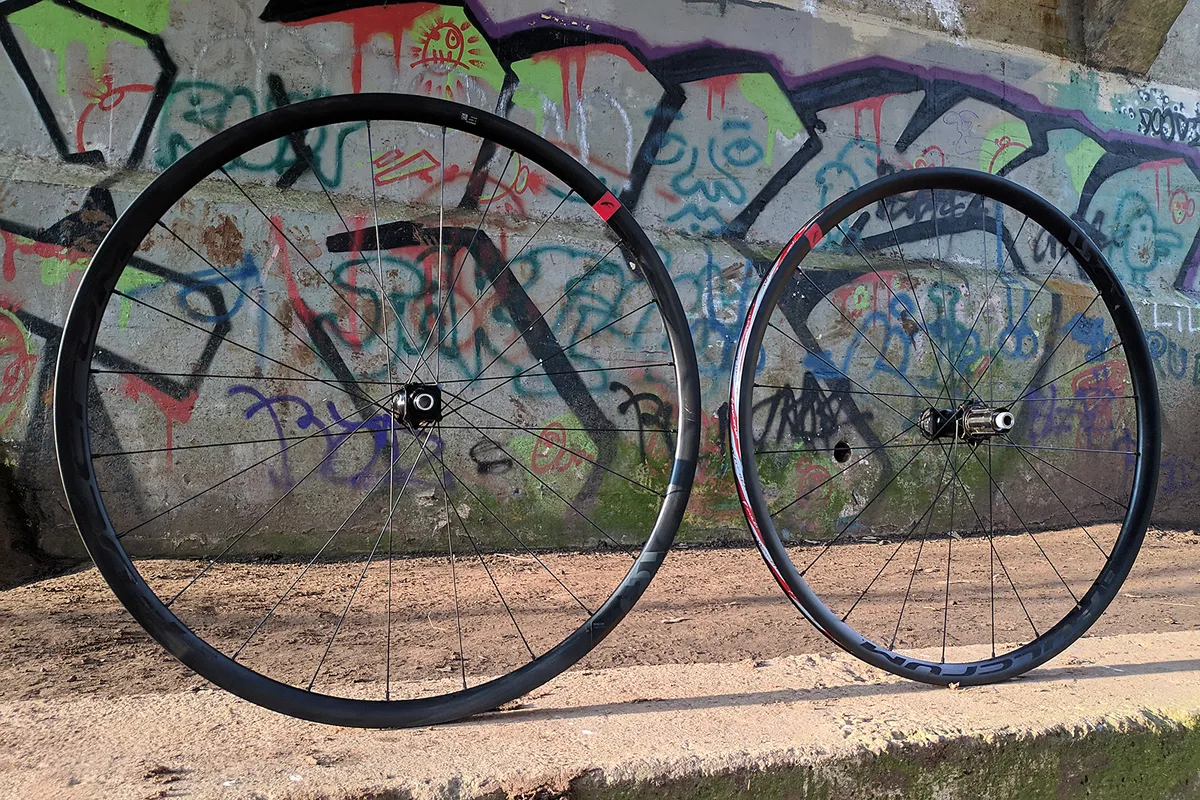
- £399 as tested
- Pros: Ideal for your first wheel upgrade; ride feel of a more expensive wheelset
- Cons: Could have wider rims
The Fulcrum Racing 5 DB has a £399 price tag but a ride feel akin to a far costlier wheelset.
The build quality of the wheel is high, with laser-etched rims, fully sealed bearings and rim tape that has neatly punched valve holes.
The wheelset uses the same two-way fit rim design as Fulcrum’s pricier wheels, making it compatible with tubeless tyres. The rims could be wider to future-proof the wheelset as road bike tyres get wider and wider.
Out on the road, the wheelset feels sprightly, getting up to speed quickly and feeling very responsive to power input. It also tracked well in corners and avoided a vague feeling, which can be the downfall of other budget wheelsets.
Having said that, the wheelset feels compliant enough to deal with longer rides where extra comfort is welcome.
Fulcrum Speed 25
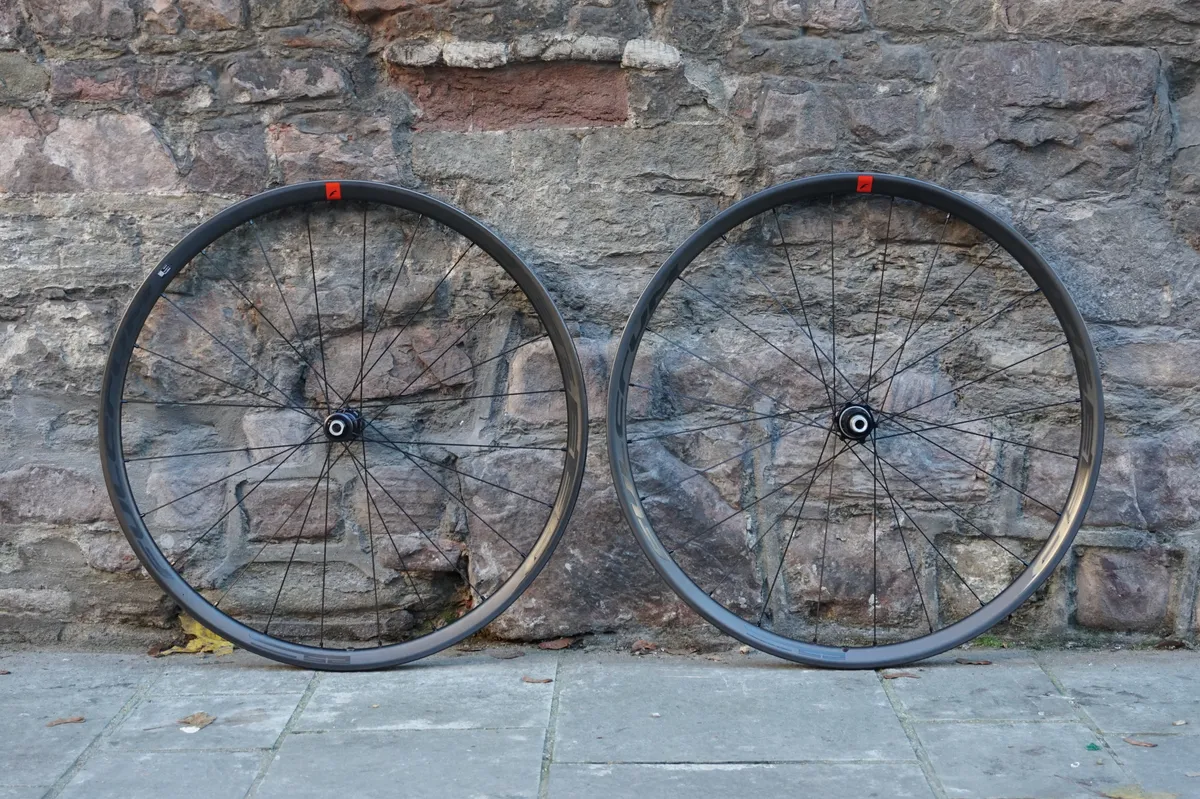
- £2,000 / $2,586 / €2,186 as tested
- Pros: Very lightweight and great handling
- Cons: 120kg total system weight
The Fulcrum Speed 25 wheelset is a disc brake climbing wheelset with ceramic bearings, the brand’s MoMog rim design and a very low weight of 1,336g.
That low weight is achieved through the shallow rim depth as well as a finish that removes the need for any weight-adding extras such as protective lacquer. On the road, this helps the wheels accelerate quickly, with the stiff and responsive design responding quickly to your input.
The wheelset is also impressive on descents. This is in part due to the 21mm internal rim width, which enables you to fit wide tyres. On the flat, the wheelset isn’t as fast as a deeper-rimmed alternative, but anyone looking at climbing wheels should be well aware of this.
Despite the climbing ability, the Speed 25 would still be a great choice as an all-round wheelset, with the overall design and ceramic bearings providing a smooth ride. Just watch out for the 120kg rider weight limit.
Parcours Strade
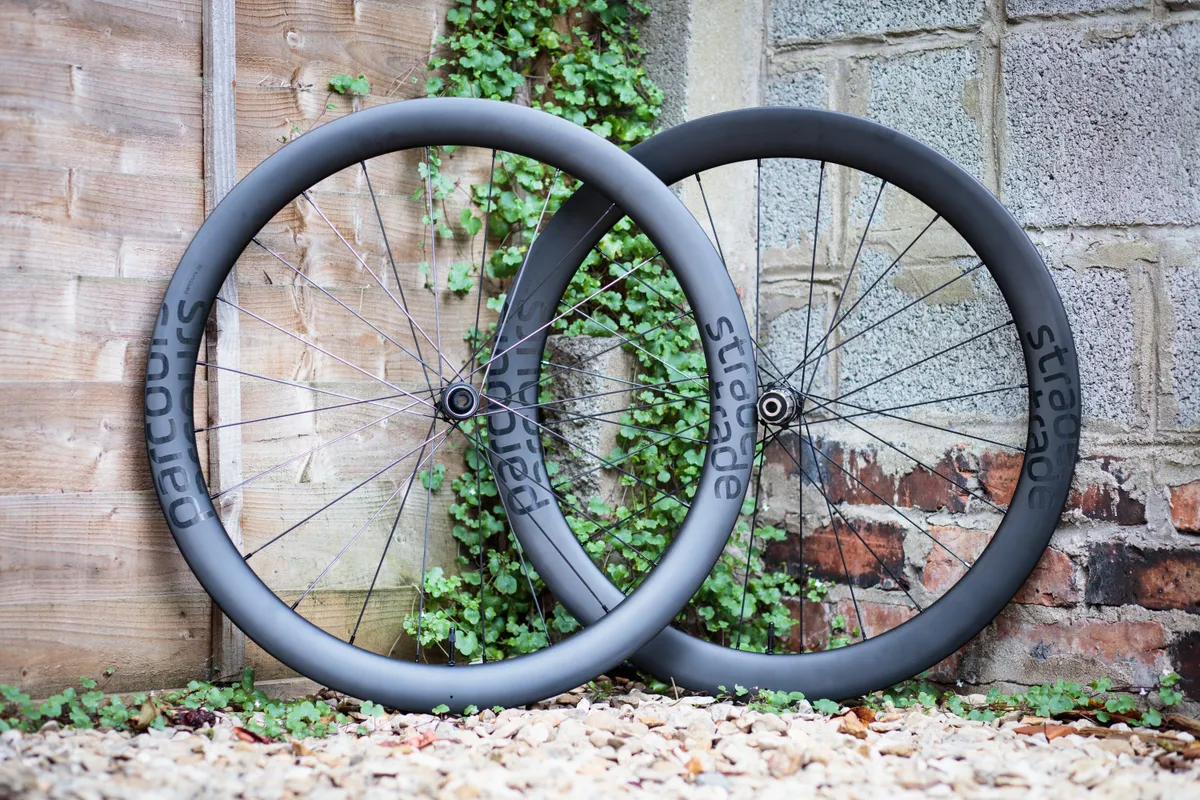
- £999 as tested
- Pros: Premium looks and progressive design; good crosswind stability
- Cons: Not ready for tubeless tyres
The result of 12 months of development, including wind-tunnel testing, the Strade wheels have different front and rear rim profiles because Parcours’ research showed that front and rear wheels experience different average wind yaw angles.
The 49mm-deep, 32mm-wide front wheel has a more U-shaped profile, while the 54mm-deep, 30mm-wide rear is more V-shaped to compensate for this. Weight is a claimed 1,520g.
You can set up the Strade wheels tubeless, although they don’t ship with the necessary hardware. You can also upgrade from the standard steel bearings to ceramic and specify other custom options.
The ride feels fast and they handle well for their depth, being relatively unaffected by crosswinds. They look smart too.
Prime Primavera 32
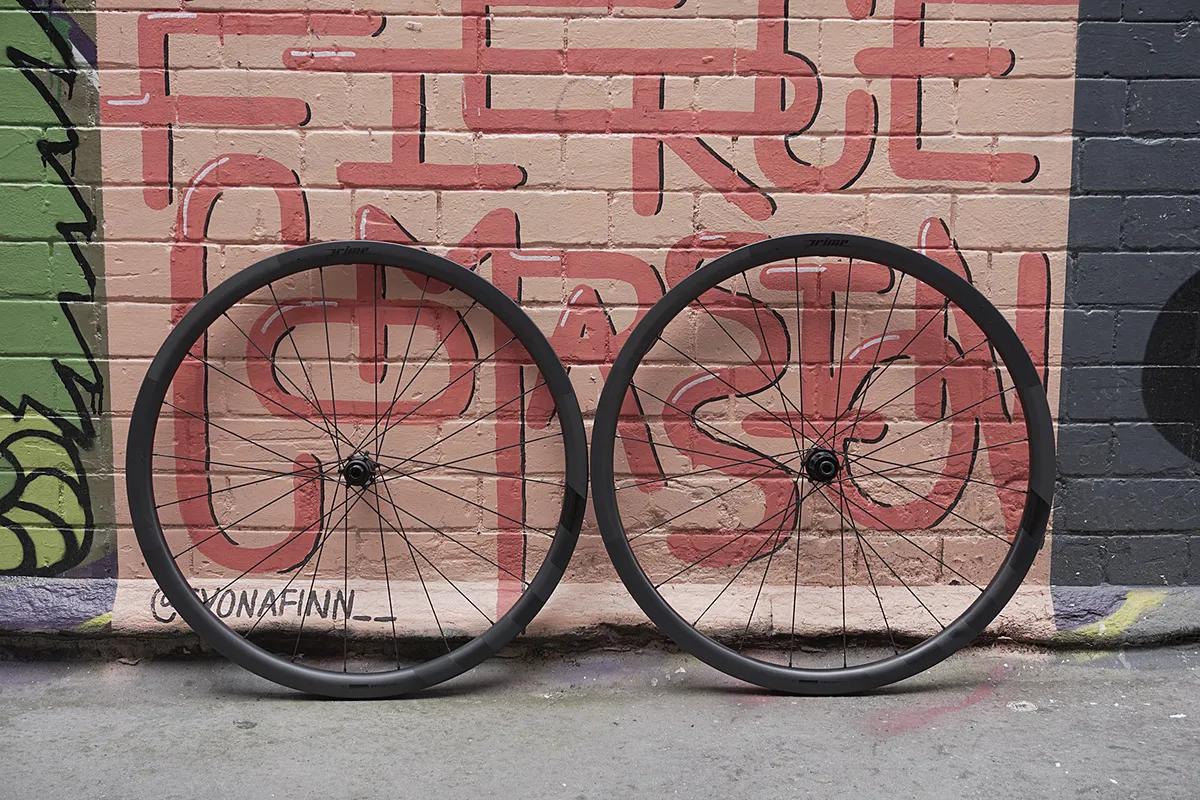
- £900 / $960 / €1,000 / AU$1,450 as tested
- Pros: Good-value carbon performance upgrade; simple to set up tubeless
- Cons: Heavier than claimed
The Prime Primavera 32 wheels feel sprightly to ride on the flat and excel on climbs despite coming in a few hundred grams overweight at 1,436g against a claimed 1,272g. Although some of this is from the fitted valves and tape, there's still quite a bit more unaccounted for.
With 32mm-deep rims, they're not the most aerodynamic, but they remain stable in gusty conditions. The hooked rims have an internal width of 23mm, which best suits 700x28mm tyres, according to the brand.
The Prime Primavera 32's performance impresses for a wheelset at this price. However, if you use a SRAM XDR or Campagnolo drivetrain, a compatible freehub costs extra.
Roval Alpinist SLX Disc
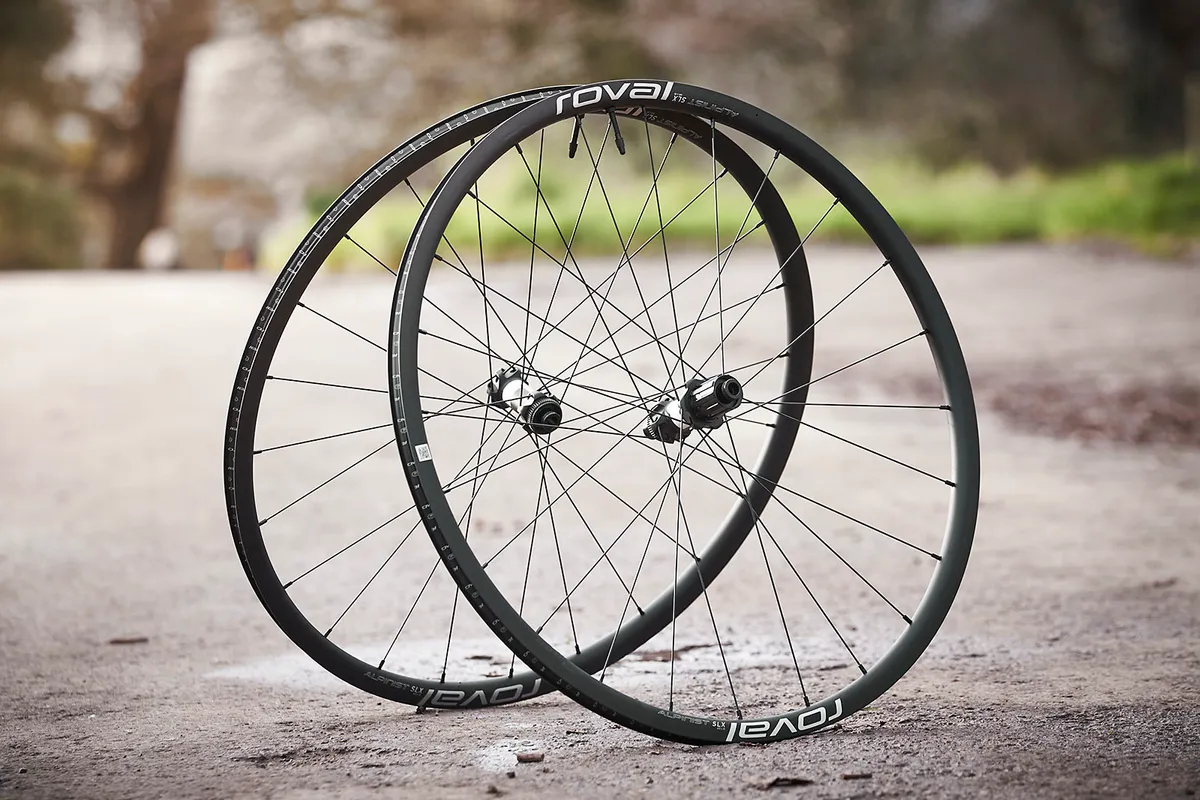
- £760 / $800 / €850 as tested
- Pros: Light and reactive; high-quality
- Cons: Cheaper alternatives exist
The Roval Alpinist SLX Disc is the only alloy wheelset in the Specialized-owned brand’s road line-up.
For an alloy wheelset, it is light, weighing 1,511g. It is well suited to climbers and feels reactive on ascents.
Our tester couldn’t feel any undue flex in the wheels. They also feel very calm in crosswinds due to the shallow rim. But they did transmit some road buzz.
The price of the wheelset poses issues. There are cheaper alloy wheels that perform nearly as well and there are budget carbon options for the price.
Roval Terra CLX
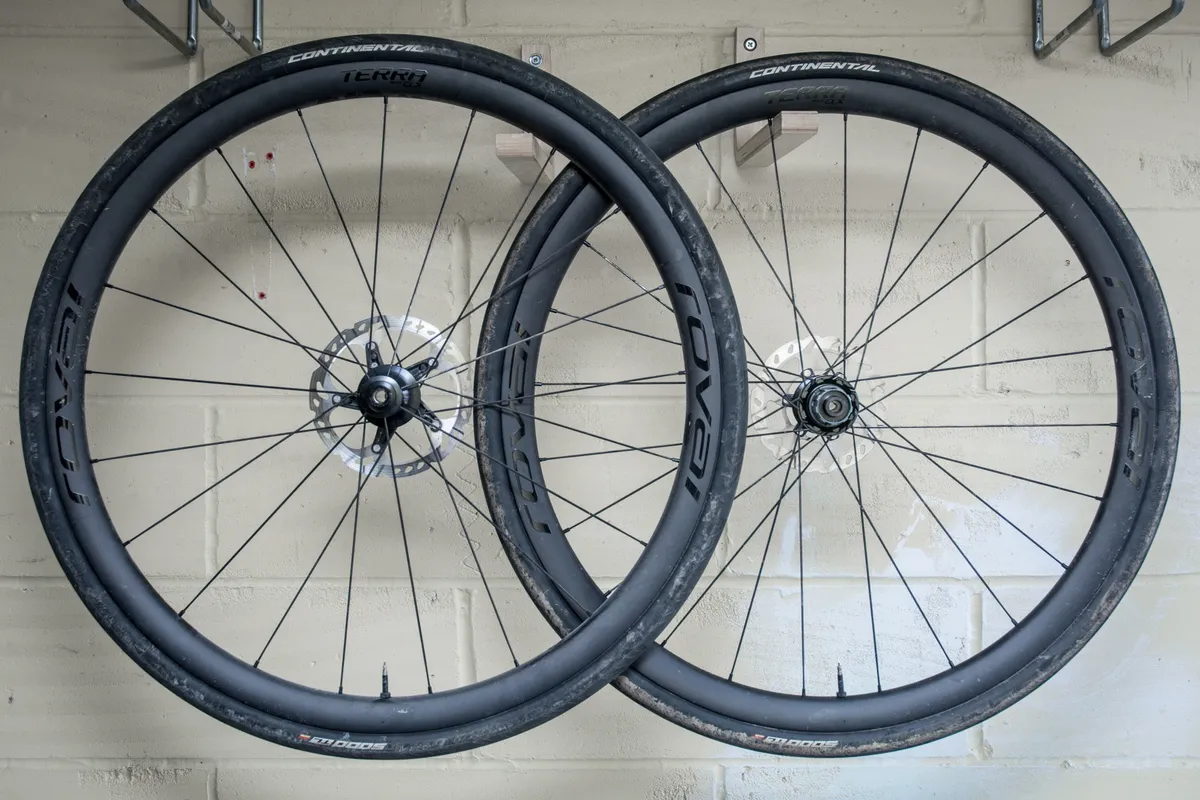
- £2,200 / $2,500 / €2,600 / AU$3,900 as tested
- Pros: Versatile; low weight
- Cons: Price
A gravel or all-rounder wheelset, the Roval Terra CLXs are 25mm internal width and 32mm deep and handle gravel tyres as well as 28mm road tyres with aplomb, with the width adding stability to wider tyres.
They’re laced up with alloy nipples, which contribute to the low weight of 1,296g. The hubs are Roval’s own, but have DT Swiss Ratchet EXP hub internals, which should be readily serviceable.
We baulked at the £2,200 price tag though, when Roval makes significantly less expensive wheels with a similar spec but a little heavier and there’s significantly cheaper competition.
VeloElite Carbon Wide 350-50
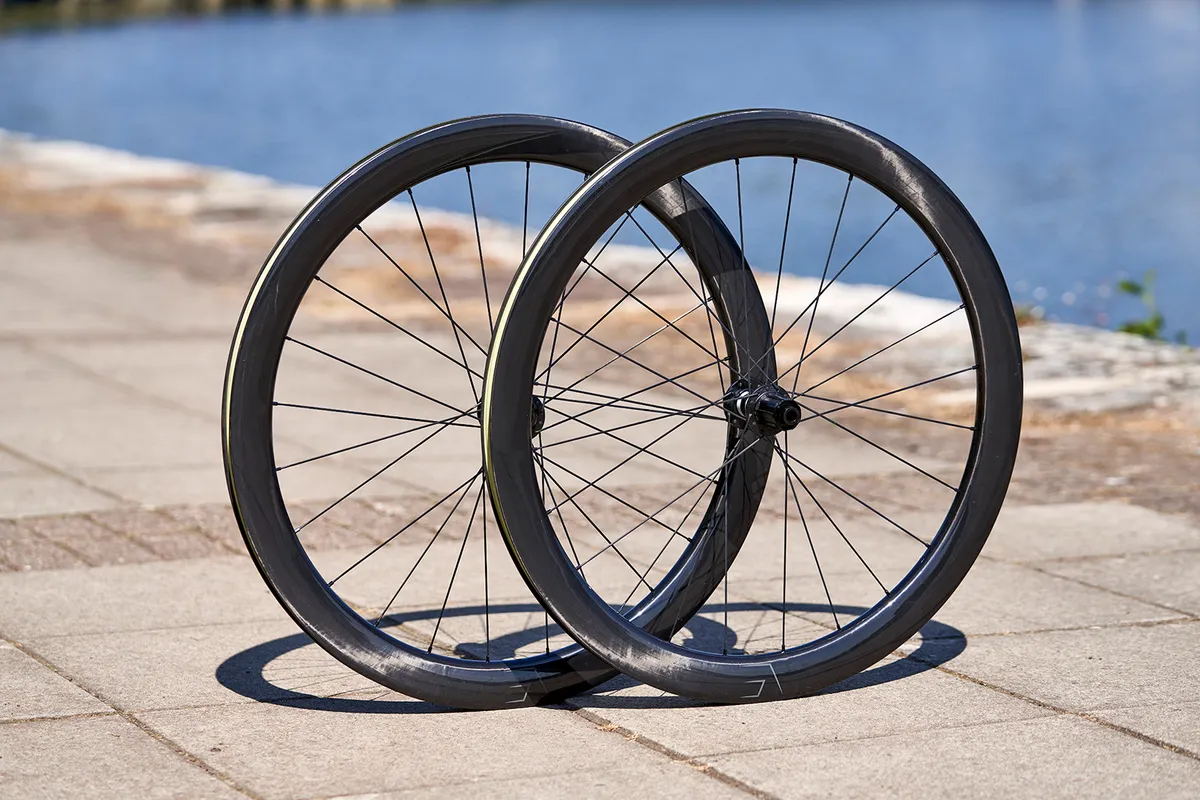
- £999 / $1,341 / €1,188 / AU$1,857 as tested
- Pros: Quality components
- Cons: Lack of supplied accessories
The VeloElite Carbon Wide 350-50 wheelset is a great choice if you’re looking for your first set of deep-section wheels or on a budget and you don’t want to shell out for a big-name brand.
At 50mm deep, the wheels offer an aerodynamic advantage but are still versatile enough for a range of riding.
With a maximum width of 30.1mm, the rim on these wheels is one of the widest currently available. This means any tyres you’ve fitted to the rim widen, and grip and braking are improved as result, leading to a confident ride.
Despite the depth of the wheels, the stiffness of the wheels doesn't quite match the performance elsewhere. There is a slightly vague feeling to the wheels when accelerating out of the saddle, but this doesn’t impact cornering.
VeloElite provides these wheels with a range of different hubs, including Industry Nine and Chris King. We tested the wheels with DT Swiss hubs and these are easily serviceable.
Zipp 303S
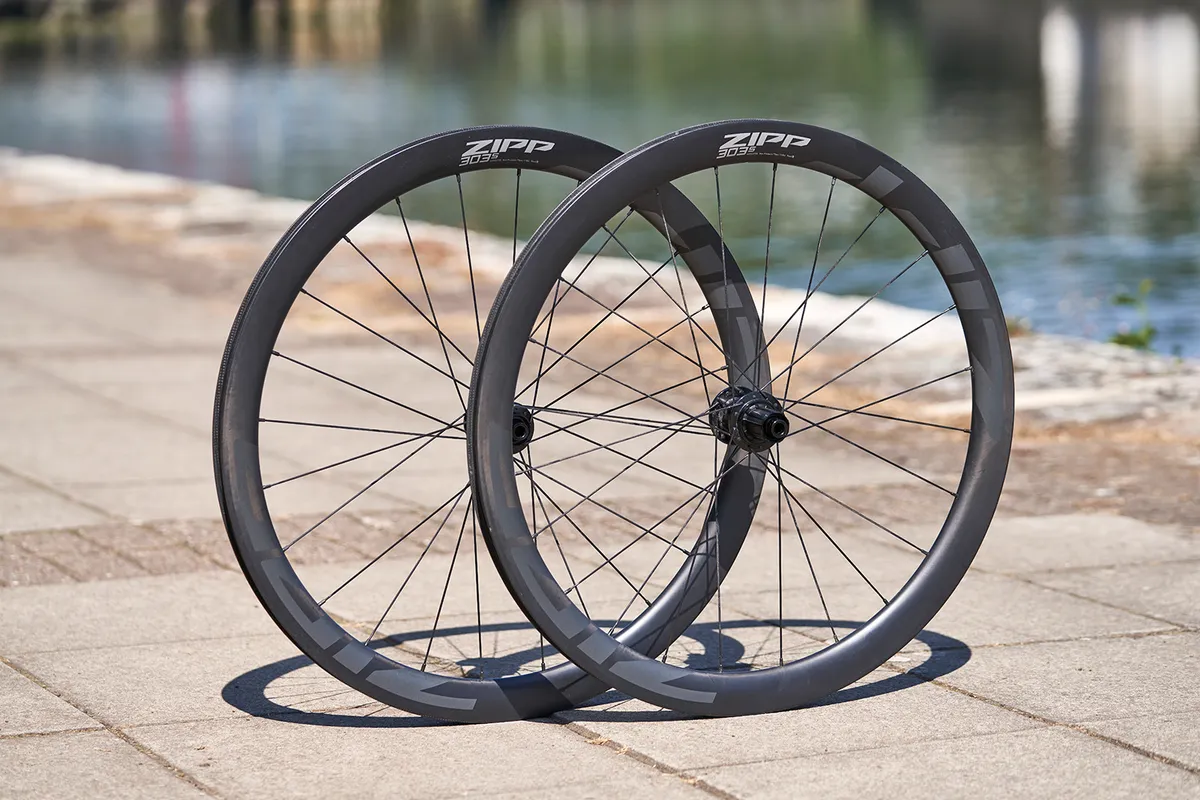
- £1,031 / $1,346 / €1,230 / AU$1,860 as tested
- Pros: Easy to maintain and sensible weight
- Cons: Slightly harsher ride than competitors
Zipp is a brand often associated with high-end bikes, but at £1,031 the 303S wheelset brings the brand’s tech to a lower price point.
The 303S is aimed squarely at those wanting to go fast, but the wide 22.7mm internal width and recommended low tyre pressure bring gravel riding and cyclocross within the wheelset’s remit.
Despite being wide and with relatively deep 45mm rims, the wheelset weighs a sensible 1,558g. Paired with a rear hub that offers a solid 10 degrees of engagement, this helps the 303S achieve a snappy and direct ride with no obvious power loss on climbs or when sprinting.
The wheelset is easily serviceable and is supplied with a wheel bag, which is a nice extra. Also included are disc-brake rotor lockrings and the rims come taped for tubeless installation.
Zipp 353 NSW
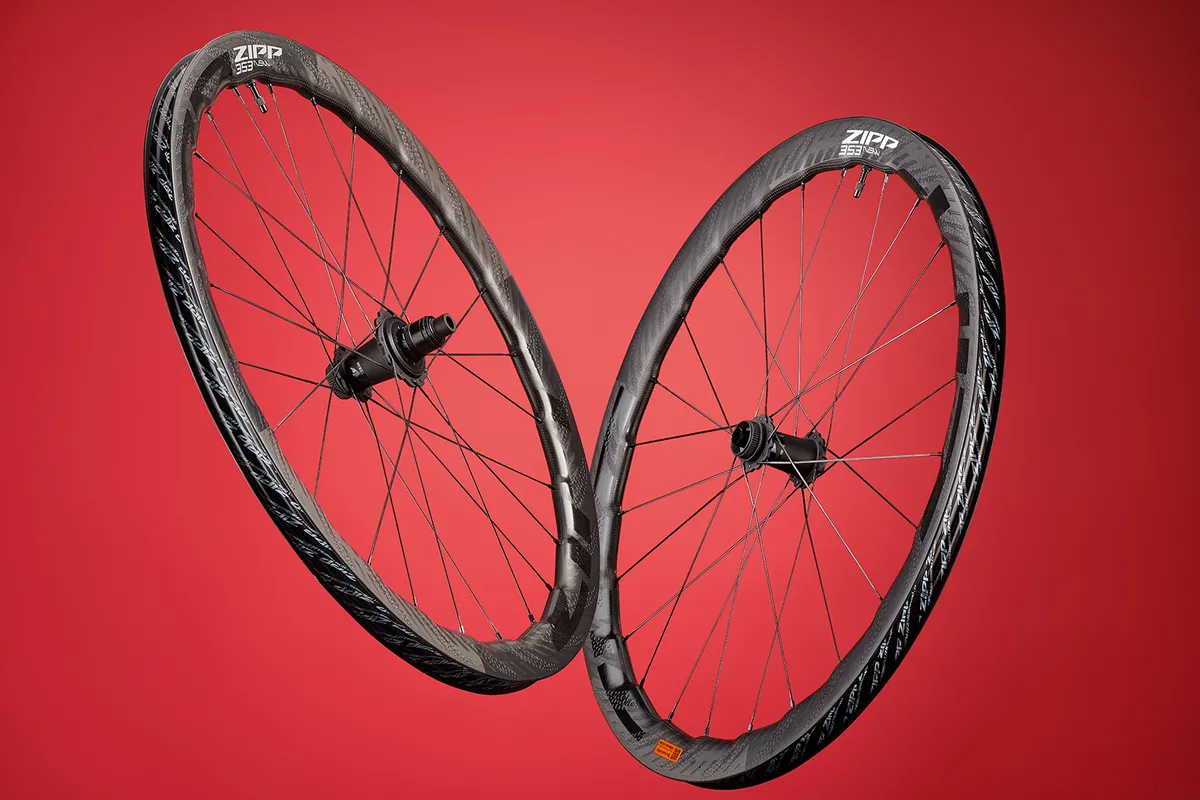
- £3,200 / $4,000 / €3,600 / AU$6,027 as tested
- Pros: Superb performance and stability with low weight
- Cons: Tubeless-only
Zipp says that the wavy profile of the 45mm-deep rim gives it the aerodynamics of a deeper wheelset, with the variable-sized, clustered dimples helping with crosswind stability. The hookless design also leads to a weight of just 1,304g a set. They roll on Zipp’s Cognition V2 hubs with a magnet-engaged freehub.
We rated their stable yet speedy and smooth ride, while the light weight means they climb really easily, and their aerodynamics and stability make them fast on the downhill side too. They’re expensive though, especially when compared to the already excellent Zipp 303 Firecrest.
Best rim brake road bike wheels
Hunt 4 Season Aero
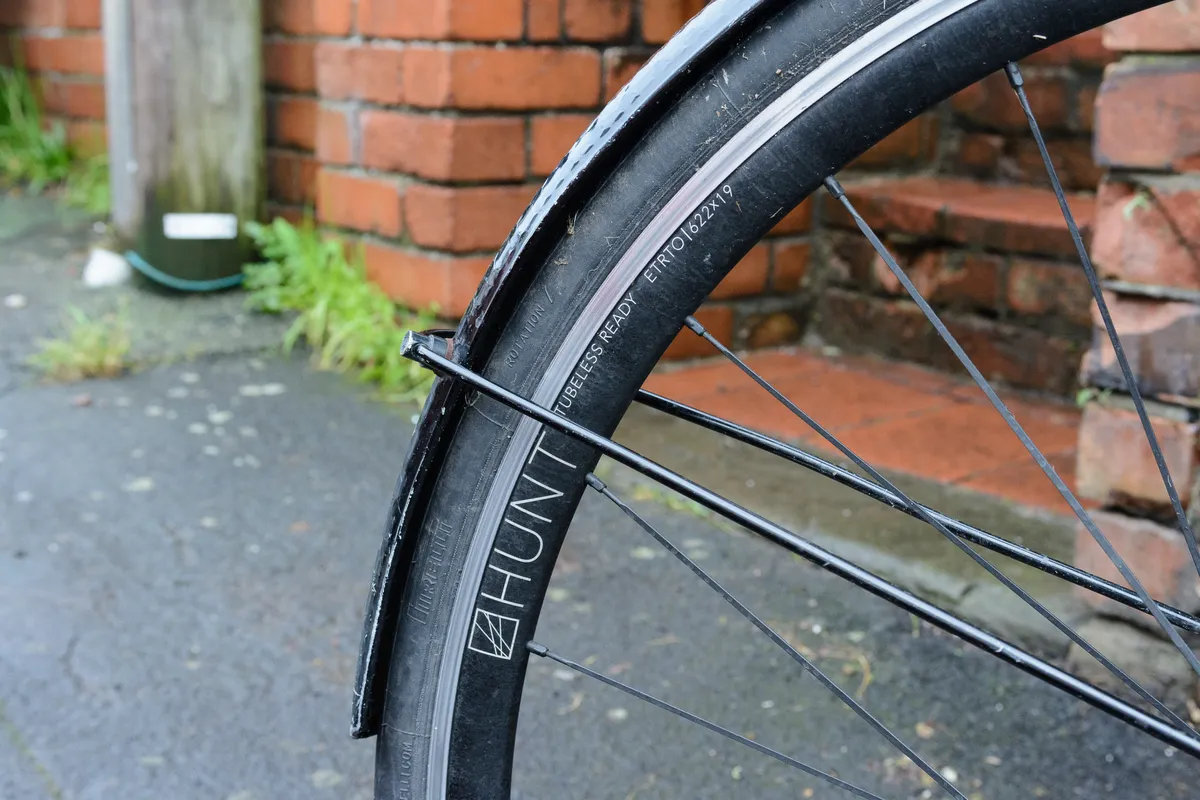
- £369 / $499 / €469 as tested
- Pros: Reliable build; painless tubeless setup
- Cons: Freehub may benefit from regular checking
Hunt's 4 Season Aero wheelset is a dependable, relatively affordable and unfussy alloy rim brake wheelset that is great for all-season use.
Built with a sensibly high spoke count, up-specced winter-proof bearings and a wide-ish rim, the wheels presented no issues in testing.
Vision SC55
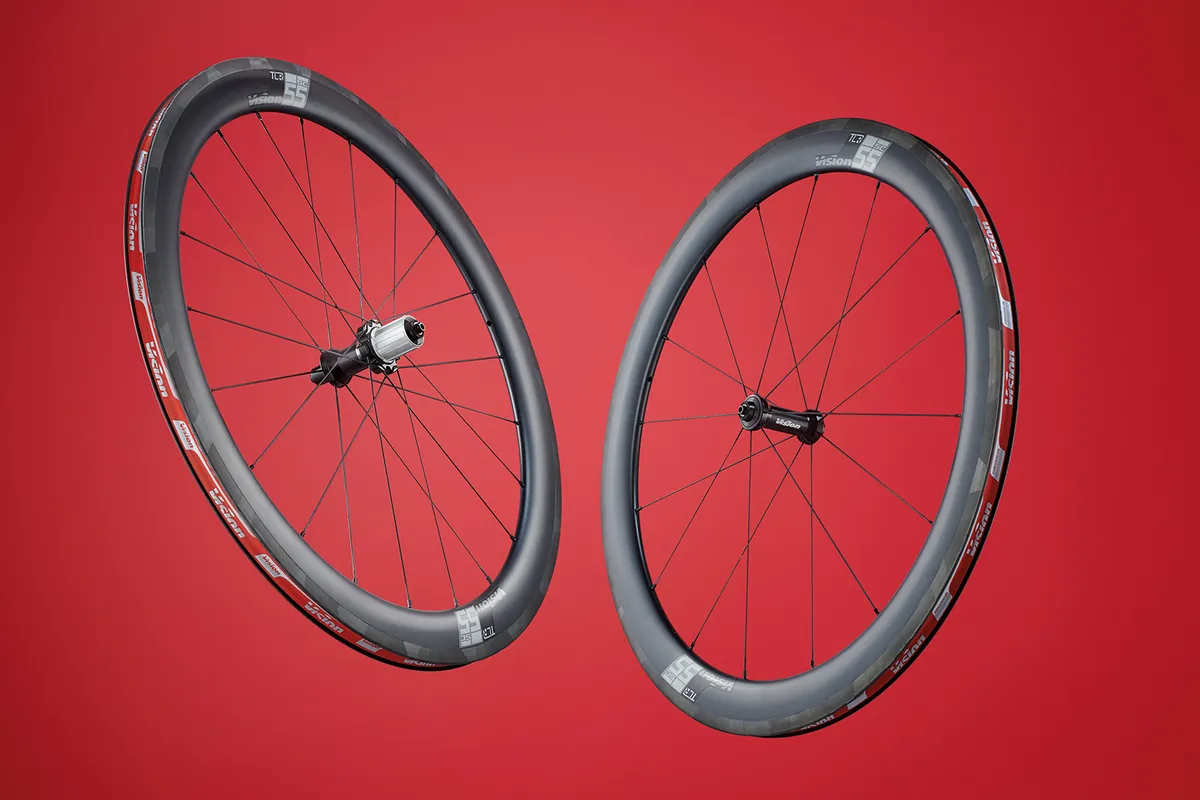
- £1,150 / $1,462 / €1,228 as tested
- Pros: Effective rim-braking performance
- Cons: Tubeless valves and tape not supplied
The latest version of the Vision SC55 has a new 19mm internal / 27mm external rim profile that’s been wind-tunnel tested and is tubeless-ready.
We were impressed at the wheels’ ability to smooth the road and add comfort to our rides. Rim-brake performance has had an upgrade too, with progressive action. There’s a fast ride feel that’s unaffected by gusts.
Weight for the Vision SC55 came out at 1,566g, which is competitive. Although we tested the rim-brake version, both the 55mm-depth and the 40mm-depth SC wheels are available with disc brakes too at the same price.
Buyer’s guide to road bike wheels
The anatomy of a road bike wheel
- Hub: The wheel spins around the hub that sits at its centre. On the rear wheel, the hub features a freehub mechanism (unless you’re riding a fixed-wheel bike), which allows the bike to coast, but drives forward as desired when you pedal. The hub contains the bearings that the axle rides on, and the axle is the part that attaches the wheel to the bike. It also lets you mount a rotor if designed for disc brakes.
- Spokes: Pieces of wire or sometimes carbon fibre that lace the hubs to the rim. The number of spokes per wheel and the material choice is important. In most wheels, the spokes are under tension and this is what gives the wheel its structure.
- Nipples: At the rim end (usually), the spokes thread into a special nut called a nipple. Most wheels can be straightened (trued) by adjusting spoke tension via the nipple.
- Rim: Sitting on the outside of the wheel, the rim holds the tyre and provides a braking surface for rim-brake-equipped bikes.
Types of road bike wheels
Just as road bikes are now increasingly being designated according to their use (race, endurance, aero, gravel and so on), wheels also fit into similar categories.
Knowing what type of rider you are and what you want out of your wheel upgrade will simplify and narrow your choices.
Climbing wheels
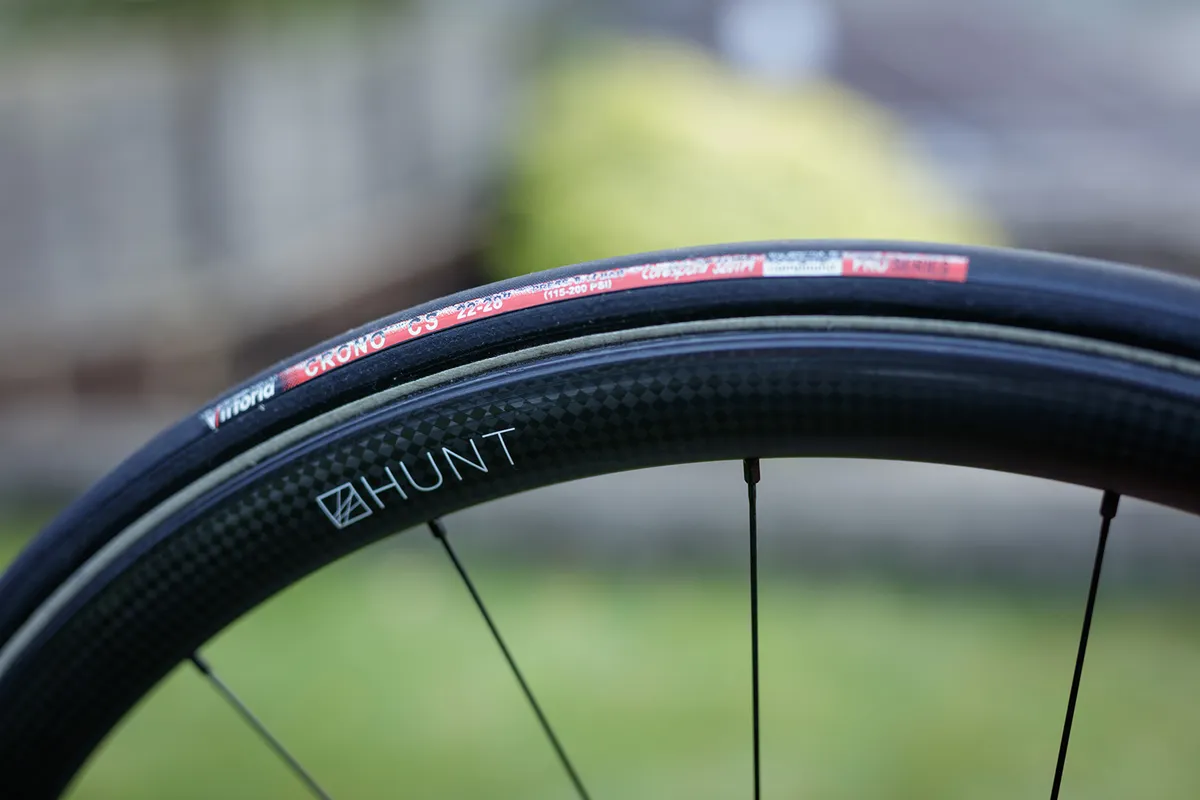
Weight is felt most when ascending, so a wheel suited to climbing is usually designed with low weight in mind. Such wheels generally feature a shallow-profile rim and a low spoke count.
Another benefit of such a wheel is seen in ride quality. Typically, the deeper a rim gets in its shape, the harsher the ride – therefore climbing wheels are often more compliant.
Where a wheelset is below 1,500g and doesn’t claim to be aerodynamic, it can often be put into the climbing category. When budget is no issue, a super-light climbing wheelset should weigh between 900g and 1,300g.
Mid-section aerodynamic wheels
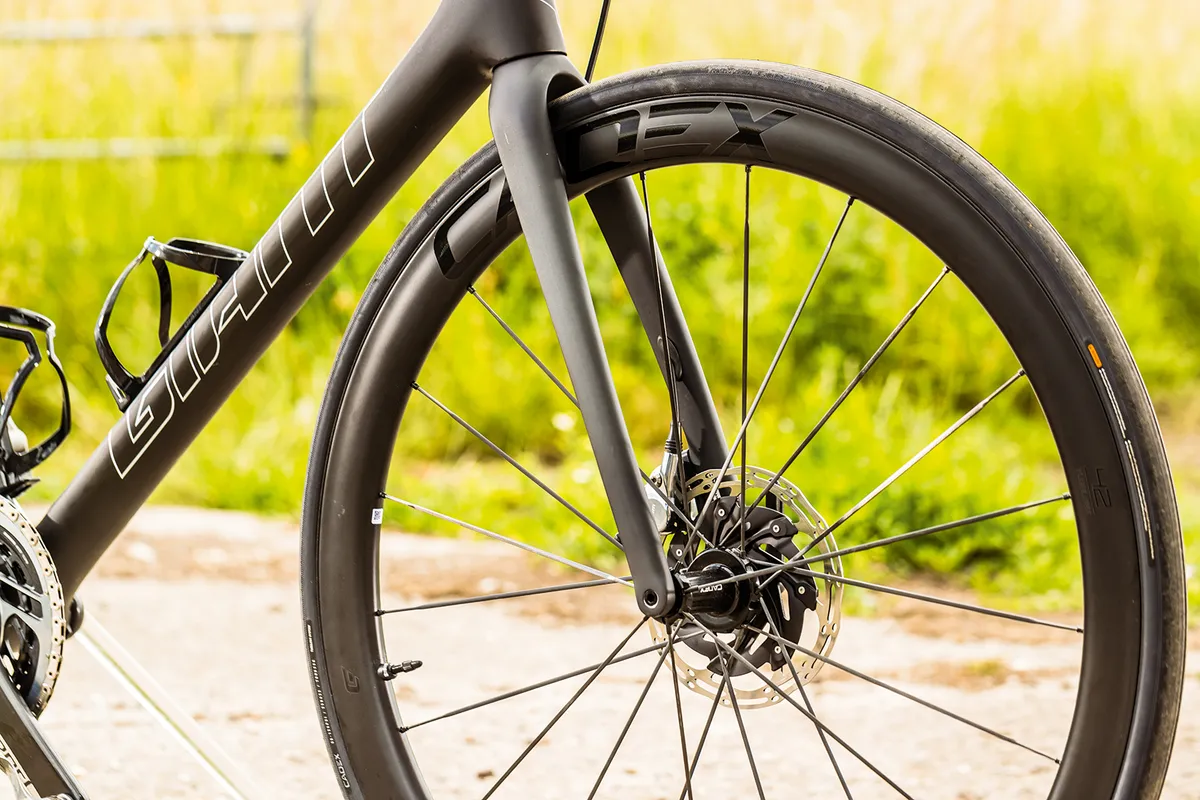
Aerodynamic wheels have quickly become a popular choice for adding some free speed and creating that ‘pro look’. An aerodynamic wheel will usually feature a deeper section rim, with a rim depth of around 35mm being the typical starting point. They're typically made of carbon, although there are alloy options available too and the majority are designed for disc brakes.
As aero designs have improved in recent years, there has been a big uptake in these mid-depth wheels which, unlike some deep-section models (see below), now provide a sensible balance between low weight, ride quality and improved performance against the wind.
Deep-section aerodynamic wheels
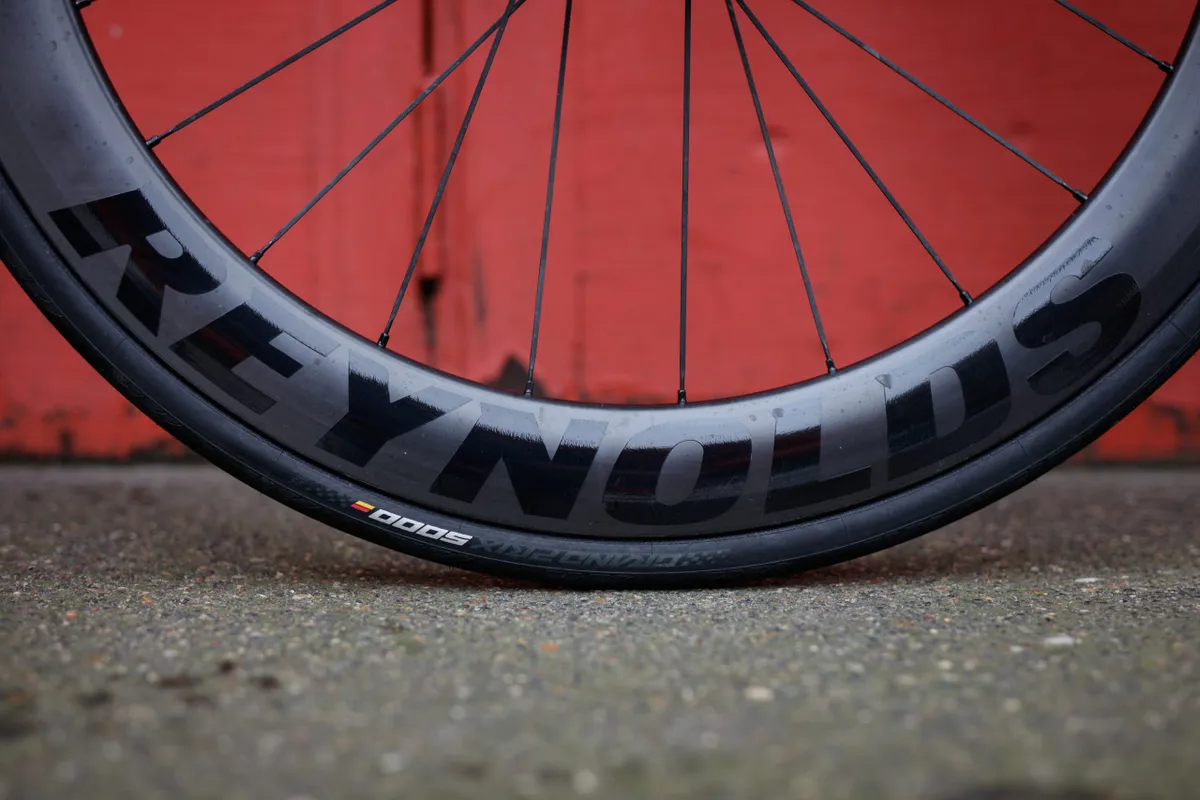
When speed is a priority, a deep-section rim of 50mm or more can potentially cut through the air with less aerodynamic drag.
However, the additional depth can cause problems if riding in high crosswinds and often adds weight, which is why mid-depth wheels have become a popular compromise outside of time trials and fast sprint courses.
Riders who race on deep aerodynamic wheels will often own a set of training wheels for use outside of racing.
Training/winter wheels
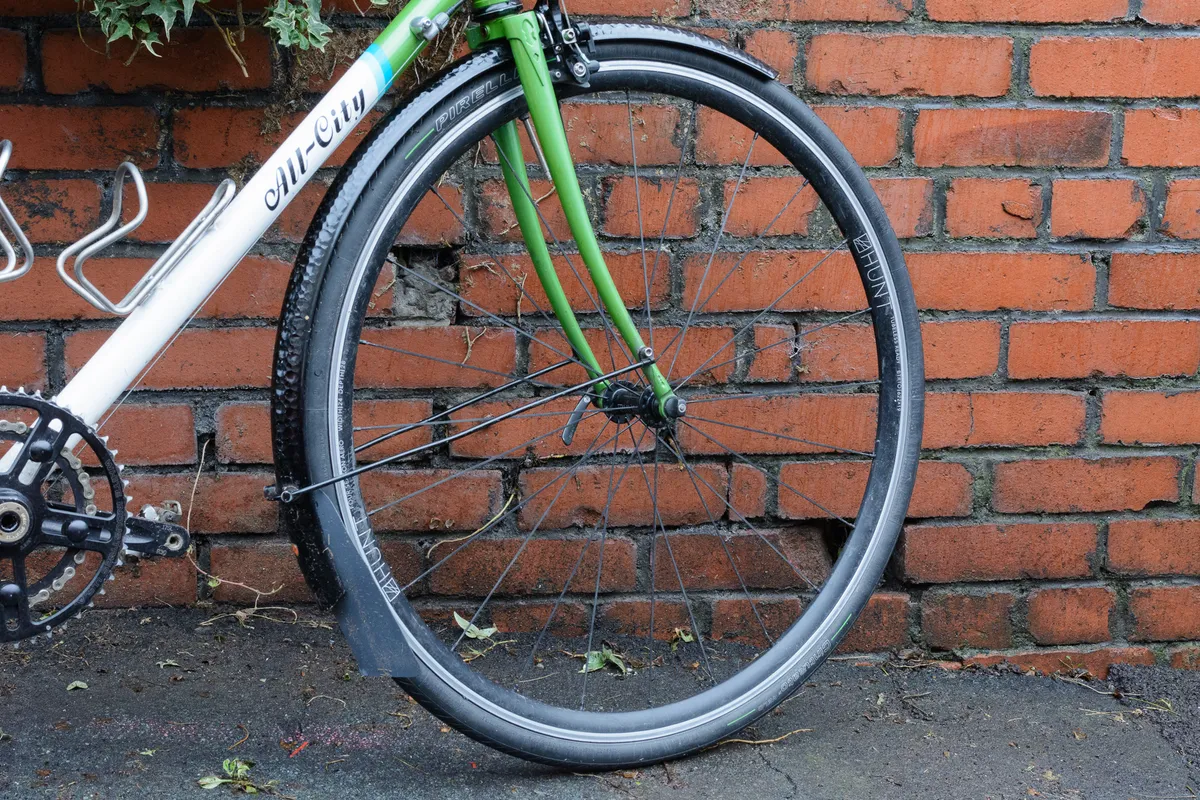
While speed, low friction and low weight are a priority for racing wheels, training or ‘everyday’ wheels must be durable and able to take a beating.
Because rims on rim brake bikes wear out over time with braking, particularly if you're riding through winter, having a cheaper set of wheels for training can extend the life of your race wheels.
A custom, handbuilt wheelset – where replacement spokes and rims are relatively cheap and easy to source – is a good choice (see below for more on these). Other options are budget wheels from major brands, which can be well built and have parts that aren’t too expensive to replace.
For this type of usage, expect a wheelset weight of 1,500g to 1,800g for something that is well priced. A budget wheelset is likely to weigh 1,900g or more.
What type of tyres do my wheels use?
There are three types of tyres for road bikes and each type needs a specific rim. For more details, read our explainer on the differences between tubes, tubeless and tubular.
Clincher tyres explained
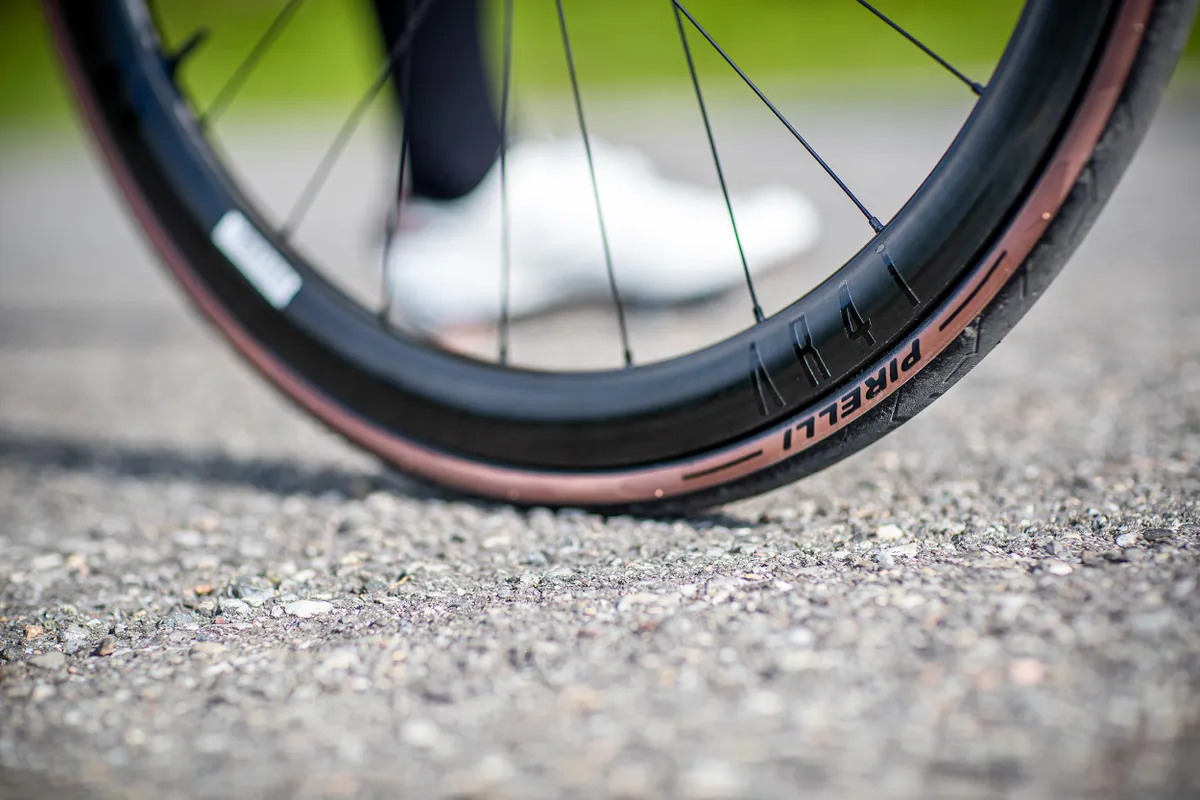
The term ‘clincher’ refers to standard tyres that use separate inner tubes to hold the air, which pushes the tyre bead into a hooked rim to hold it in place.
This is the most common wheel type on road bikes. Generally, where tyre type isn’t mentioned, it’s safe to assume it’s a clincher.
Tubeless tyres explained
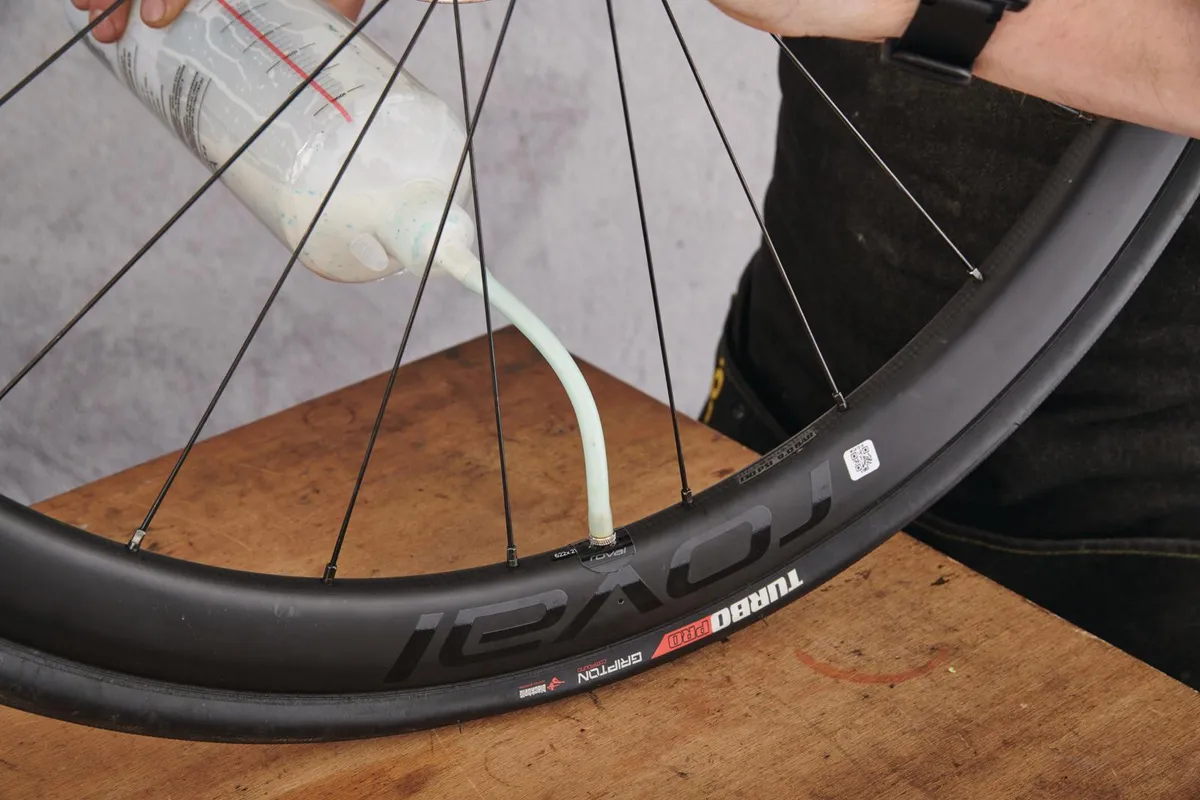
Tubeless tyre technology has been a thing in mountain biking for a long time, but it’s now making serious inroads on road bike wheels.
As the name suggests, tubeless tyres don’t require an inner tube – just like a car tyre. Instead, sealant and tubeless-ready rims are used to create what is essentially an airtight clincher system.
Manufacturers claim that removing the inner tube can decrease rolling resistance, banish the risk of pinch flats at lower inflation pressures and that the sealant can seal small punctures while riding.
For more info on road tubeless technology, check out our podcast episode where some of our most knowledgeable writers sat down to discuss the what, why and how of road tubeless tyres.
Tubular tyres explained
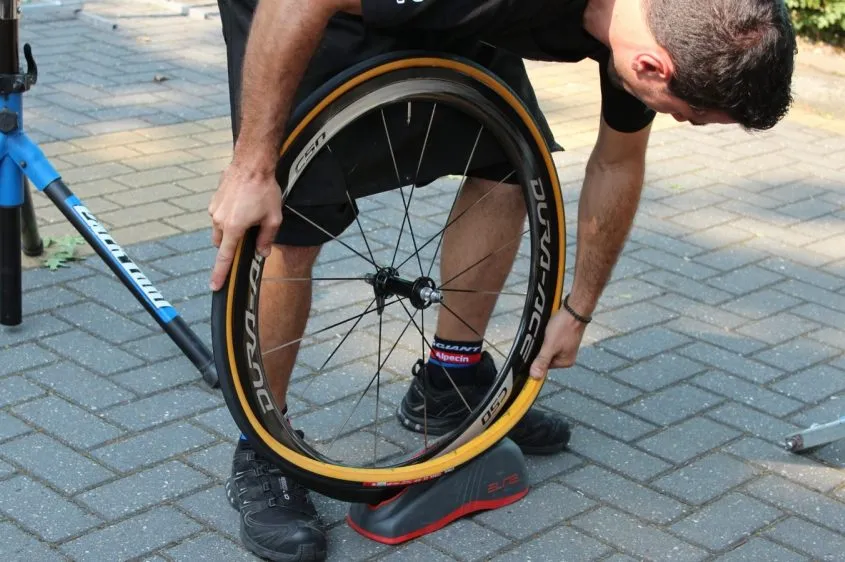
Tubulars (often shortened to ‘tubs’) are the oldest type of road bike tyres. They usually consist of an inner tube sewn into a fully enclosed tyre casing, which then has to be glued or taped onto a compatible rim.
Tubeless tubulars do exist (i.e. an airtight tubular with no inner tube), but these are relatively uncommon.
The advantage of tubular tyres largely lies in the fact that a tubular wheelset can be made relatively lighter. This is because the material used to create a rim that can withstand the high internal pressure of a clincher or tubeless tyre adds significant weight.
Tubular tyres can also be ridden flat for short distances, which can be advantageous in a race.
It’s for these reasons, and tradition, that tubular tyres and wheels are still dominant in the professional peloton (where riders don’t have to fix their own punctures or pay for new tyres) and hill climb events, though this is beginning to change, albeit slowly.
Road wheel rim materials
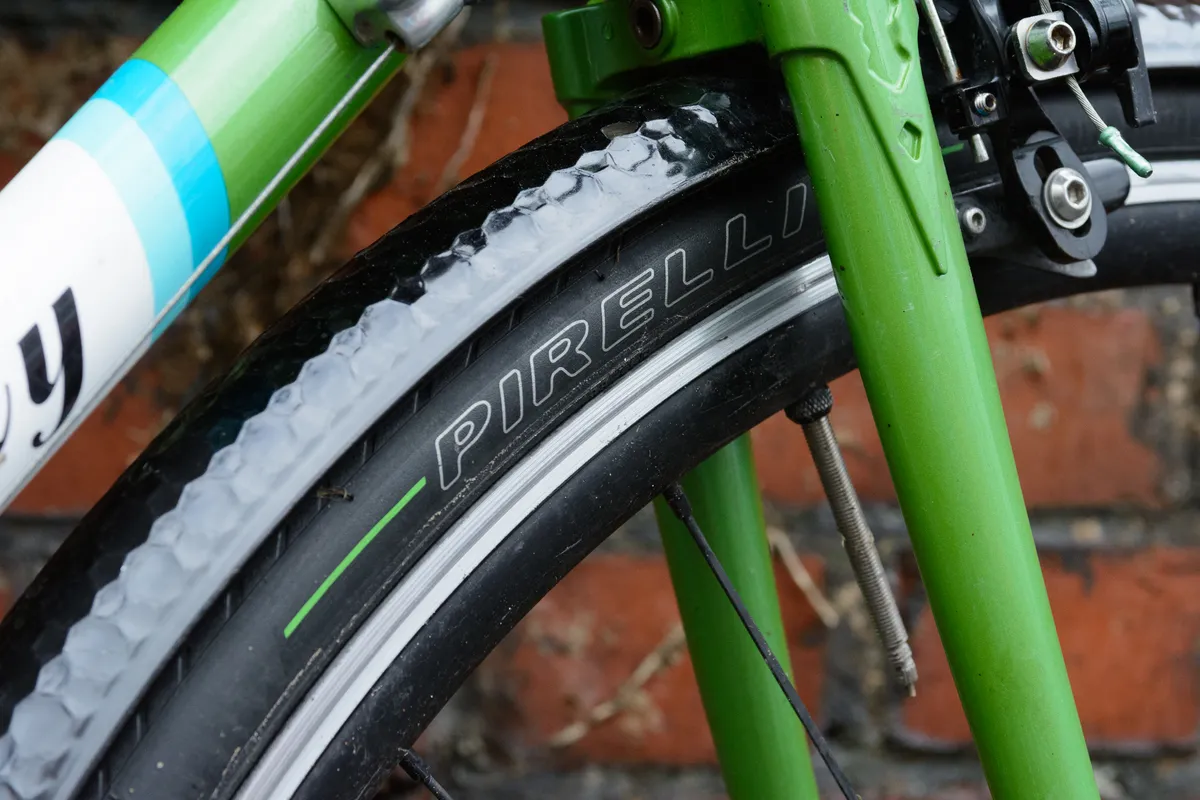
Aluminium is typically found in any wheel below £800 / $1,200 / AU$1,500, with carbon wheels generally being priced above that (although we are starting to see brands offer carbon wheels below that mark).
Just like with road bike frames, carbon fibre has become the standard material for performance race wheels, where stiffness, weight and aerodynamics are the priorities.
Aluminium still sets the benchmark for braking performance on rim brake wheels, especially in wet conditions. Carbon rims have made massive strides in this area in recent years, though. However, if your bike has disc brakes, this isn’t a concern.
What diameter are road wheels?
The standard road bike rim size is 700c, with the name coming from an approximate metric measurement taken from the diameter of the wheel including an inflated tyre.
Some brands will spec a 650b wheel on smaller frame sizes to improve their geometry and 650b is an important option for gravel bikes, but the vast majority of modern road bikes use a 700c wheelset.
If you look closely enough at your road bike tyre, you’ll likely see numbers such as 23-622 or 25-622. These numbers are the international tyre sizing standard, with the first numbers referring to the tyre width (23mm, 25mm) and the second series of numbers, in this case 622, referring to the bead seat diameter (BSD) of the tyre designed to fit a 700c rim.
Road wheel rim width explained
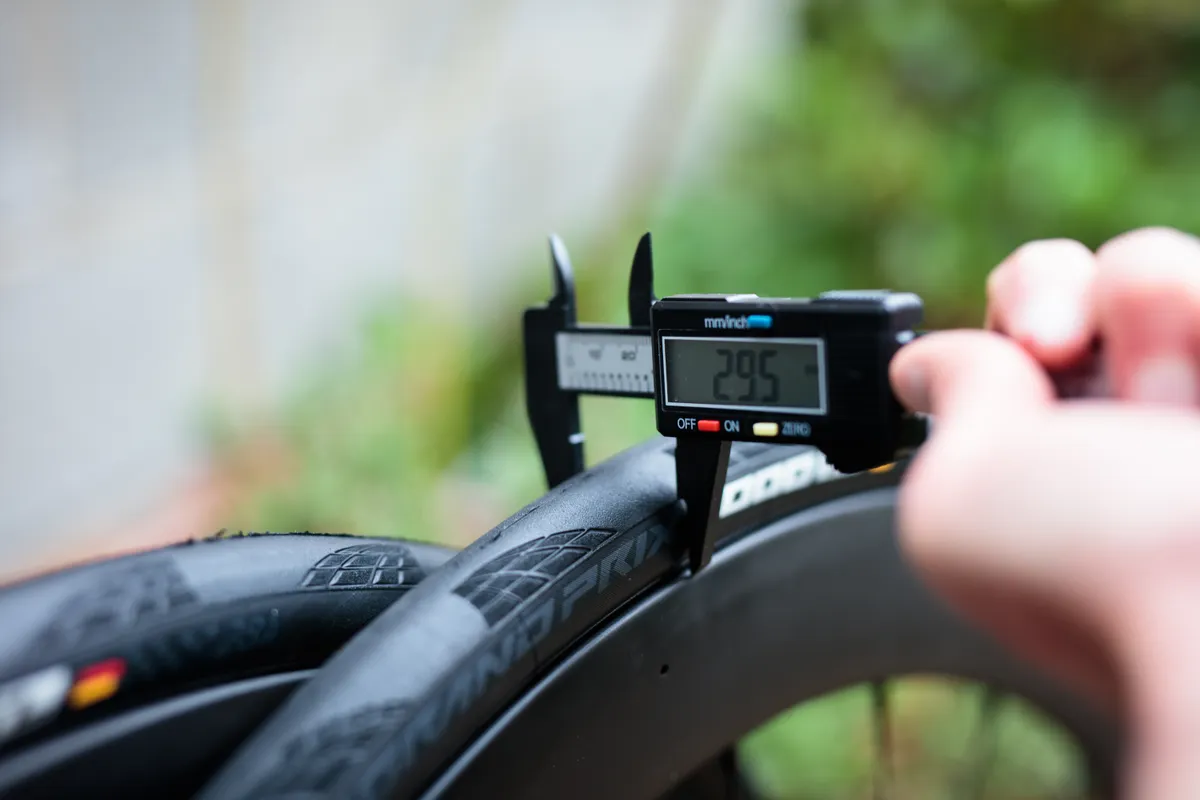
While the 622mm bead seat diameter is an industry standard, the width of the rim is not.
Recently there has been a trend towards wider rims because they offer greater tyre volume and a stiffer wheel, which in turn provides a more comfortable ride, improved bike control, lower rolling resistance and potentially fewer pinch flats.
The confusing part is that some brands quote external rim width, while others internal.
Looking at internal width, anything under 14mm is considered very narrow, 20mm and over is wide and anything between is sufficient for common 25mm tyres, although they'll sit happily on wider rims too.
Internal width is important because of the effect it has on tyre profile. Narrow internal rim widths give tyres a ‘lightbulb’ cross-section which can narrow the contact patch and reduce grip, whereas wider internal rim widths cause the contact patch to flatten out and increase in size.
For those racing, wider rims have been shown to be more aerodynamic too, as the rim can integrate with the tyre more smoothly. This is because a wider rim can help form a smoother aerofoil shape with wider road tyres.
Axle sizes
We've got a separate guide to road bike axle standards, but here's a quick run-down...
If your road bike was built in the last 20 years and has rim brakes, it most likely has a 130mm width quick release rear axle (written as 130mm QR or 130 × 9mm), and a 100mm (100 QR, or 100 × 9mm) quick-release front.
However, the introduction of disc brakes greatly confused this and for a while there were multiple standards for bikes with disc brakes, most of which were thru-axle designs borrowed from mountain biking.
If you were an early adopter of road disc brakes, it’s best to refer back to the manufacturer of your bike to find out exactly what standard is used on your model.
That said, it looks like the industry has finally settled on one unifying standard for disc brake road bikes: 12mm thru-axles with 100mm spacing in the front dropouts and 142mm spacing at the rear.
If only they could do the same for bottom bracket standards…
Freehubs and drivetrain compatibility
Situated on the right side of the rear hub, the freehub is what holds the drivetrain’s cassette and allows drive to the rear wheel.
Although most 11-speed designs are now backwards compatible, you must be careful to match the freehub to your drivetrain brand.
Shimano/SRAM 11-speed freehubs
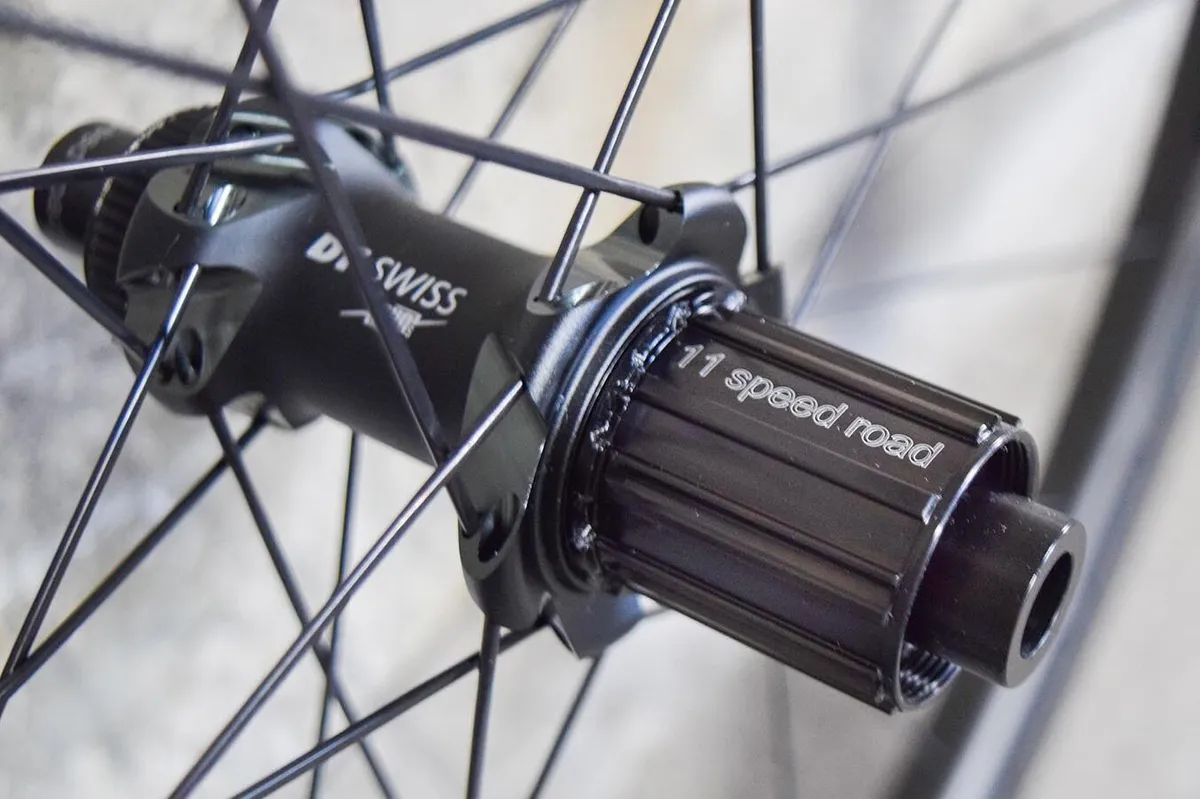
This spline system hasn’t changed a great deal in the last 20 years, with the exception of 11-speed forcing a wider freehub. Shimano-compatible 11-speed wheels usually include a spacer for use with 8-, 9- or 10-speed cassettes.
SRAM 11-speed cassettes use Shimano’s spline system, so are cross-compatible. The exceptions are newer SRAM cassettes designed for its XD driver (more on this below).
Shimano 12-speed
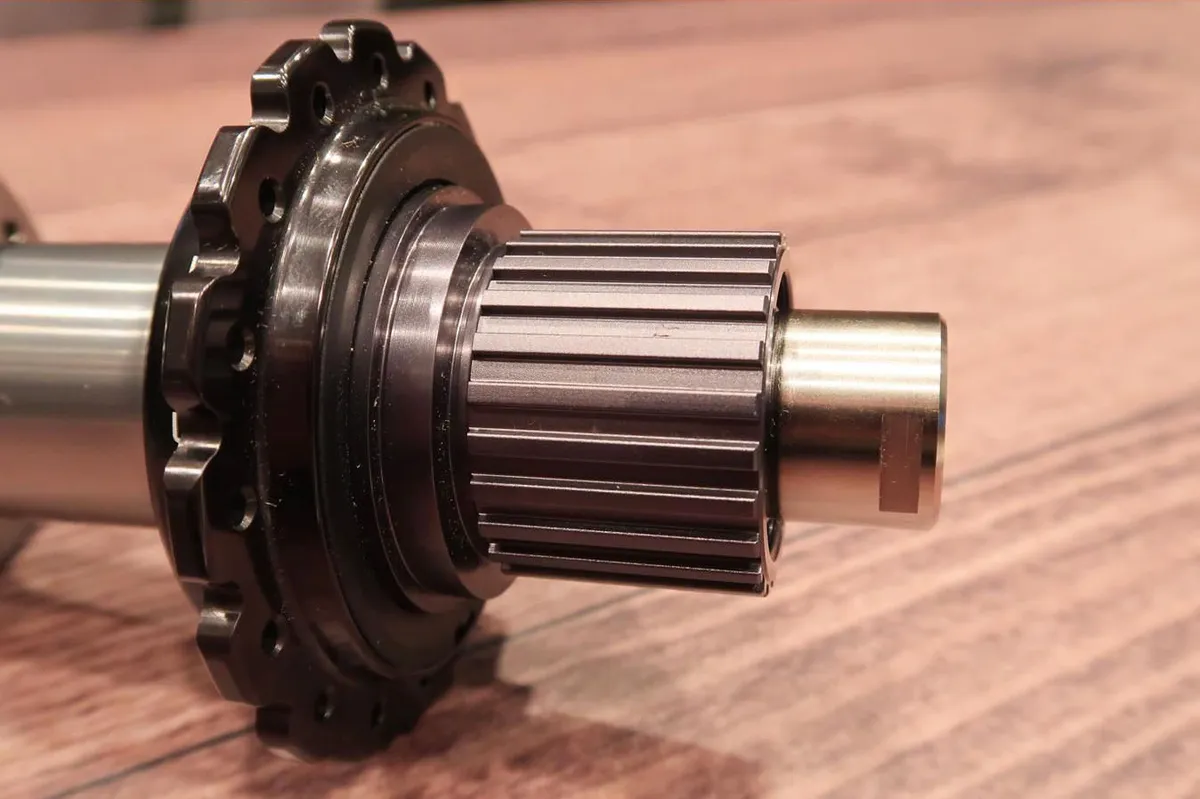
Shimano's new 12-speed cassettes and wheels come with a new spline pattern too, with smaller more numerous splines, although it's not the same as the Micro Spline format used in its 12-speed MTB freehubs. The new pattern means that 12-speed Shimano road cassettes are backward compatible with 11-speed freehubs, but you won't be able to fit an 11-speed cassette to a freehub with the new spline pattern.
Campagnolo freehubs
The freehub diameter and splines of Campagnolo freehubs are very different to that of Shimano/SRAM.
If you have Campagnolo gearing, ensure that the freehub body is matched. Many aftermarket wheel brands will sell freehub bodies as a replacement part – so it’s possible to switch a Campagnolo wheel to Shimano and vice-versa (Shimano-branded wheels being a key exception here).
It’s perfectly possible to use an 11-speed Campagnolo cassette with a Shimano or SRAM 11-speed drivetrain (and vice versa) though, so you might not need to switch the freehub at all in that instance.
When Campagnolo went 12-speed it simply reduced the width of the 12-speed chains and cassettes to fit on existing 11-speed Campagnolo compatible freehubs. Hallelujah.
The latest Campagnolo wheels use a new standard called N3W. This uses a freehub body that's shorter and compatible with the Ekar gravel groupset. Campagnolo makes an extender that fits on the N3W freehub, so that it will also accept its road cassettes.
SRAM XD and XDR driver
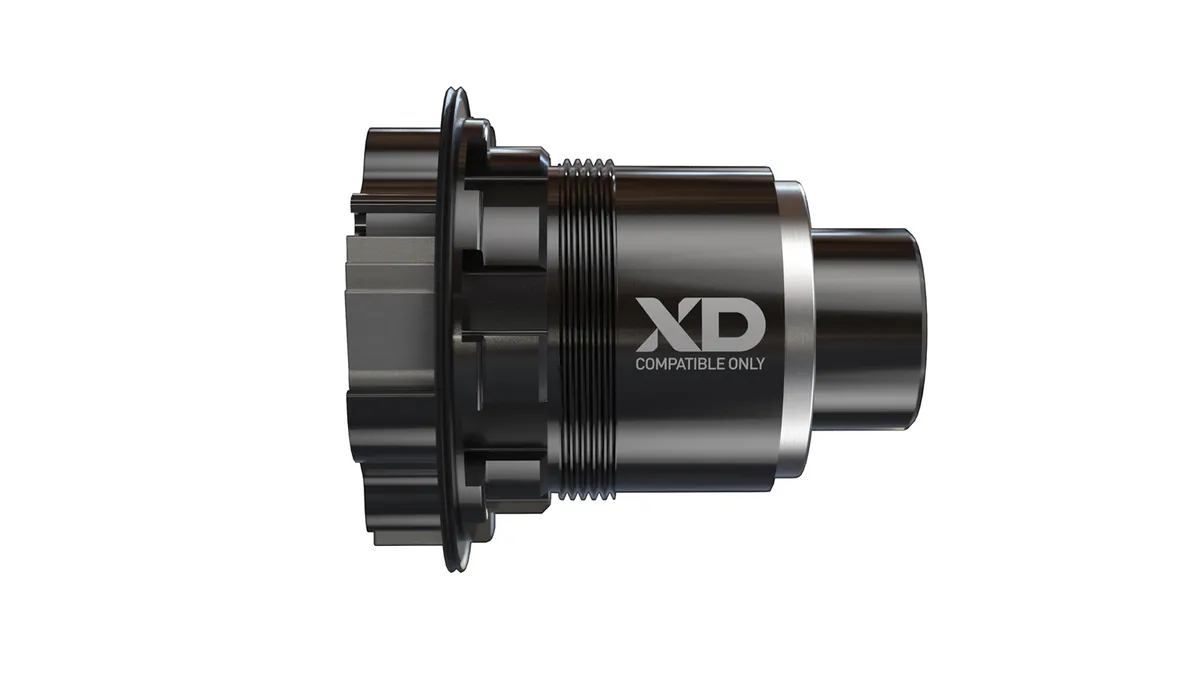
The increasing popularity of 1× and the advent of 12-speed drivetrains (and the subsequent desire for cogs smaller than 11t) has thrown a spanner in the cross-compatibility charts.
SRAM’s solution is the XD driver for off-road and the XDR driver for road use, which are essentially just new freehub standards that enable the use of cassette cogs down to a tiny 9t.
Rather like tubeless tyres and disc brakes, this tech began life on mountain bikes before eventually making its way over to road wheels with the introduction of SRAM’s AXS groupsets. The XDR freehub is slightly wider than XD, so you can run an MTB cassette on an XDR body (with a spacer), but not vice versa.
Freehub ratchet speeds
A feature that’s commonly overlooked in a hub is the ratchet speed, also expressed as points of engagement or the angle of uptake. Hubs typically don’t have fewer than 18 points of engagement per 360-degree revolution, but hubs that offer more can provide the feeling of faster acceleration and pick-up out of corners. Typical values are between 24 and 48, but some hub designs go much higher.
Some brands quote points of engagement, while others tell you their hubs' engagement angle, which is 360 degrees divided by the number of points of engagement.
Road wheel braking explained
Rim brakes have long been the standard for road bikes. But as mentioned above, disc braking, a technology proven with cars, motorbikes and mountain bikes, is rapidly taking over for road cyclists.
Disc brakes add another element to the decision-making process.
Disc brake road wheels
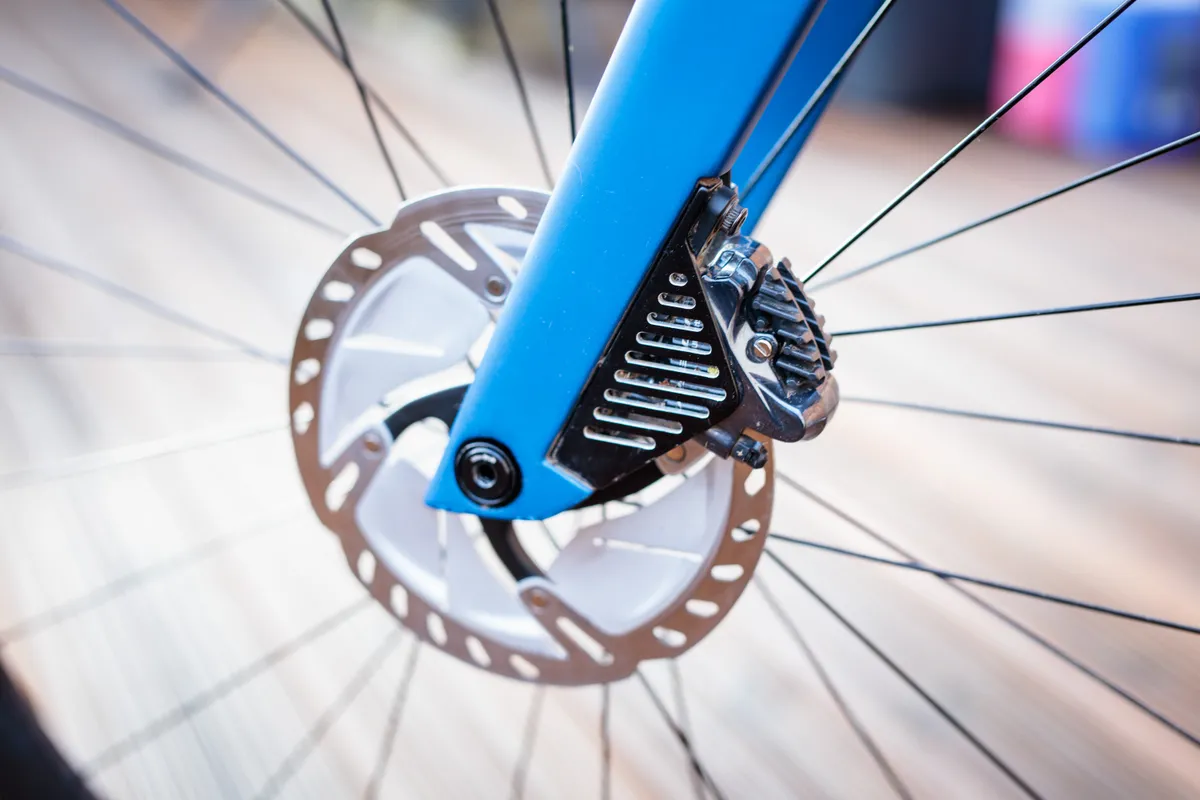
Disc brake wheels feature a hub with a mount for the disc rotor.
Because of the high forces these rotors exert on a wheel when braking, disc-brake wheels often feature higher spoke counts, which add a little weight.
The flip side is that rims on disc brake wheels can be made lighter and more aerodynamic because they aren’t also required to act as a braking surface.
It’s worth noting that fitting disc brakes to a road bike isn’t as simple as swapping out the wheels; both the frame and fork must be designed to accept disc brakes too.
When buying disc brake wheels, it’s worth being aware that there are two types of rotor mount: centrelock and six-bolt.
Centre Lock is a splined system originally from Shimano, which is more-or-less standard on road bike wheels. It can also be used with six-bolt rotors with the use of an adaptor. Six-bolt hubs can only fit six-bolt rotors.
Rim brake road wheels
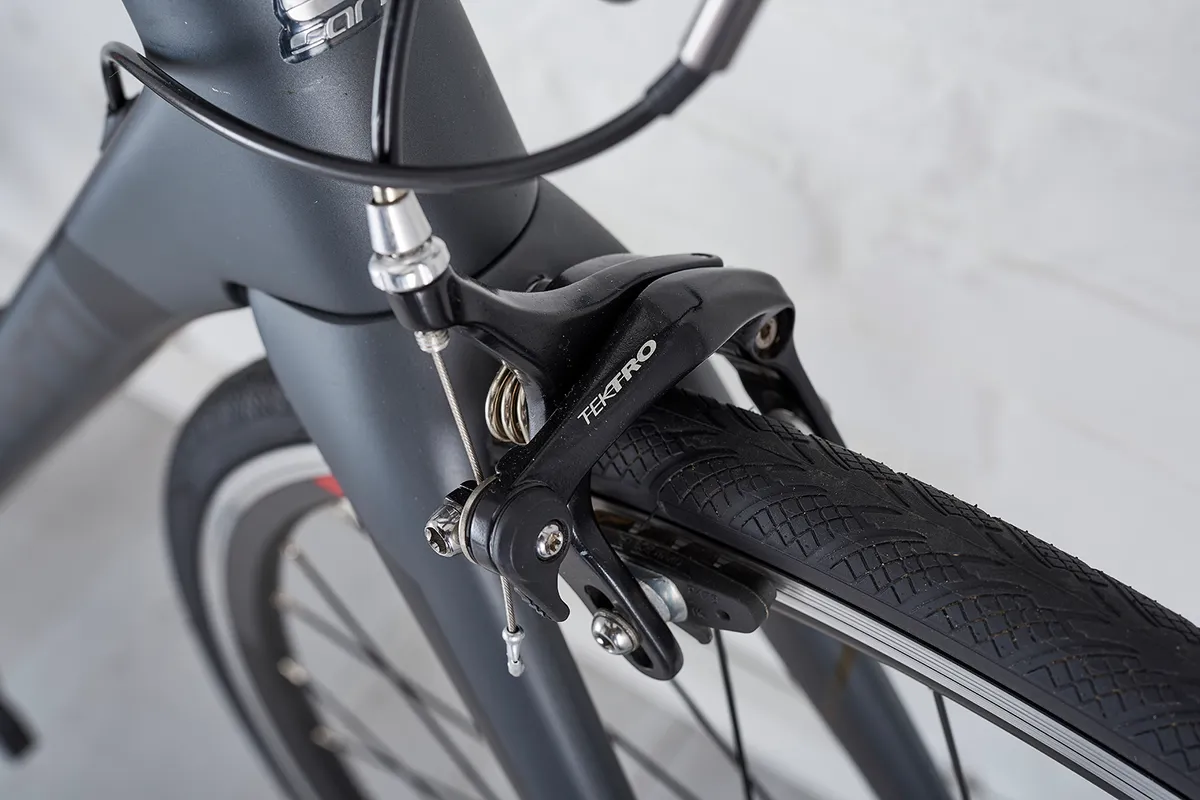
Many road bike wheels are still designed for use with rim brakes, which means the rim must offer a consistent braking surface.
This is why good quality aluminium rims claim to offer a ‘machined’ surface, which generally guarantees an even braking surface at manufacturing.
Over time, braking in gritty conditions will not just wear down the brake pads, but the rims too. A worn brake track can be dangerous because the high pressure of a road tyre can cause the rim to crack and explode.
Look for a small dimple or groove on the surface of your rim – this is a wear indicator. When it starts disappearing, it’s time to get your rim or wheel replaced.
Carbon rims typically don’t perform as well when braking, especially in the wet or in extreme conditions such as descending long, steep mountains and need specialist pads. Keep this in mind if you’re considering a carbon wheel for everyday use or are swapping between carbon and alloy rims, as you'll need to swap the pads too.
Spokes
Spokes lace the hub to the rim. Generally, wheels with higher spoke counts are stronger and more durable, but this comes with a weight and slight aero penalty.
Typically a spoke is made from a piece of stainless steel wire that’s been cold-forged and then had a thread added to it. Some higher-end wheels may use spokes made from aluminium, carbon fibre or even titanium.
When it comes to a quality wheel build, correct spoke tension is critical. Too loose and the spokes can unwind, and the constant flex will eventually lead to broken spokes or cracked rims. Too tight and there’s an increased risk of the rim cracking at the spoke attachment point or a nipple failing.
Factory vs. hand-built wheels
The merits of factory vs. hand-built wheels are often argued.
Confusingly, factory wheels are, in fact, commonly built at least partly by hand. The key distinction however is that factory wheels are built to an exact specification and you buy them as an off-the-shelf item, often with proprietary spoke and rim designs.
Hand-built wheels take a more classical approach, where the hubs, spokes, nipples and rims can be bought separately and chosen to best suit a rider’s individual needs.
Generally speaking, race wheels are mostly sold as factory options. The big wheel brands dominate this space due to their research, development and marketing through sponsored teams.
Hand-built wheels are commonly kept for training, long-distance and everyday uses. However, there are of course examples where the opposites are true.
Buying second-hand road bike wheels
Wheels can be expensive and second-hand items are commonly available for sale. Just as with a bike, the actual use and repair history of the wheels is crucially important when buying used.
Your first step is to check how straight (true) the wheel is. Give it a spin and ensure it’s not buckled. Also, check for any ‘hop’ within the height of the rim – nobody wants an egg-shaped wheel.
- Rims: Check for wear of the brake surface (on rim brake wheels), which should be flat and without any concave shape. Look for any sign of chips and then inspect the whole rim for cracks, especially around the spokes.
- Spokes: Check that all the spokes are straight and without gouges or scratches. Squeeze the spokes two at a time – all the ones on the right should feel roughly even in tension with each other. Now do the same for the left, which should feel similar. Unevenness is a sign of a bent rim that’s being held in shape by spoke tension.
- Hubs: Spin the wheels by holding onto the hub axles. The bearings should spin freely without any drag or notching. Check that the freehub spins yet grabs when you rotate it forward. Also, be sure to double-check freehub compatibility with your gears (as outlined above).
Road wheel glossary
- Asymmetric rim: As the rear cassette sits on the right side of the hub, the point at which the spokes attach from the rear hub is offset to the left. With this, an asymmetric rim is designed to give a more direct path from these offset spokes to the rim, with the desired result being a sturdier and stiffer wheel, and more even left–right spoke tensions
- Axle: The hub spins around the axle, which is attached to the dropouts of the frame and fork. On a road bike, the axle is always hollow and designed to work with a thru-axle or quick release skewer
- Bladed spoke: A flattened spoke that’s designed to cut through the wind with less resistance. Bladed spokes are common in high-end wheels and also help to provide an edge for a tool to hold onto, which can allow for a higher spoke tension to be achieved. Top spoke brands DT Swiss and Sapim both claim that their best bladed spokes are not only their lightest option, but also the strongest and most durable
- Butted spoke: A process that sees the centre of the spoke being made thinner than the outer sections. When done correctly, this encourages the spoke to flex away from weak points, therefore leading to improved durability at a lower weight. Double-butted means two different thicknesses and triple-butted means three thicknesses
- Cartridge bearing: In this system, bearings are contained in a cartridge that features the ball bearings and inner and outer race as one unit. The outer race is a tight press-fit into the hub shell, while the axle contacts the inner race. These items are considered disposable, where old ones are tapped out and new cartridges pressed in place
- Centrelock: a Shimano spline system for mounting a brake rotor onto the hub
- Clincher: The most common type of tyre system on a road bike. Here a bead on the tyre locks with a lip on the rim. Non-tubeless clincher tyres use inner tubes to hold air
- Cup and cone bearing: The alternative to cartridge bearing hubs is cup and cone. It’s most common on entry-level wheels and all those sold by Shimano. These feature loose ball bearings that run on a permanent outer bearing race, with a cone-shaped inner race that can be adjusted
- Disc brake: Brake technology that's now common in cycling that fixes a thin metal plate braking surface (rotor) at the hub with a caliper attached to the frame that clamps onto it to slow the bike down
- Dish: The relative position of the rim to the hub. On nearly all frame designs, the rim must be perfectly centred over the hub
- Double-wall rim: This refers to the internal cross-section of a rim. Where a single wall rim has one layer of material for the spokes to connect to and the tyre to sit on, a double wall rim adds an additional level of material separating the two. This additional layer creates a box type section, which greatly aids in rim stiffness and wheel durability
- Eyelet: A reinforcing ring in the spoke hole of a rim. An eyeleted rim typically allows for greater spoke tension and therefore a more durable wheel. A rim that claims to feature double eyelets will have the eyelets travel through both walls of the rim (see double wall rim)
- Freehub body: The mechanism on the rear wheel that allows a rider to coast or pedal backwards without resistance
- Hub: Sitting at the centre of the wheel is the hub, which contains the axle, bearings and rear freehub and holds the spokes
- Machined sidewall: A finishing process to a rim brake wheel after the rim is made, which helps ensure its braking faces are parallel and even
- Nipple: The nipple is the nut of the spoke. Typically the nipple sits at the rim, though some wheel designs place the nipple at the hub
- Open-tubular: A type of clincher tyre system that replicates the construction of a traditional cotton tubular, but in clincher form. Open tubulars differ slightly in their manufacturing technique, which is generally to a level similar to high-end tubulars
- Quick-release: A tool-free mechanism for attaching a wheel to a bike. It consists of a threaded rod connected to a lever-actuated cam assembly. The rod slides through a hollow hub axle and a nut on the opposing side allows tension adjustment
- Radial lacing: Where the spoke leaves the hub and meets the rim in a straight line. This is the easiest form of wheel building and results in the shortest length (lightest weight) spoke possible. This style is popular for rim brake front wheels, but does not resist torque appropriately for use on the driveside of a rear wheel or with disc brakes
- Rim: The outward hoop of the wheel that holds the tyre and acts as a braking surface for rim brakes
- Rim tape (AKA rim strip): Protective tape used to cover the multiple spoke holes in a rim. Without this, an inner tube would expand through the rim holes and puncture. Some top wheelsets from Shimano, Fulcrum, Mavic and others do not require rim tape. Tubeless setups often require tubeless-specific rim tape because the system must be made airtight, so make sure to check you have the correct tape for your tyres
- Sealed bearing: Another name for cartridge bearing
- Sleeve joint: A method by which an alloy rim is joined to form a circle. Sleeve joints are a form of rivet; they are cheaper to produce than a welded joint
- Spoke: Wire rods that connect the hub to the rim. They can be made from steel, stainless steel (most common), titanium, aluminium or carbon fibre
- Spoke flange: The section of the hub that the spokes attach to
- Spoke gauge: This refers to the thickness of the spoke. Most common is ‘14G’, which commonly equates to a 2mm diameter, ‘15G’ is thinner at 1.8mm. Therefore, ‘straight gauge spokes’ feature a single diameter, whereas the most common double-butted spokes with a 2/1.8/2mm diameter across the length are sometimes referred to as ‘14/15G’
- Three-cross: This refers to the lacing pattern of the spokes where each spoke crosses past another three times. This pattern is most common on 32 or higher spoked wheels
- Thru-axle: A large axle that slides through a closed frame dropout and the hub, screwing into threads on the far side of the wheel, allowing for a stiffer and more secure wheel connection. Thru-axles are commonly used on disc brake road bikes
- Trueness: This refers to how straight a rim runs, adjusted via spoke tension (hence the expression to ‘true’ a wheel)
- Tubeless: An airtight clincher tyre system that uses a tight tyre fit, air pressure and tubeless sealant to hold the tyre in place. No inner tube is required. Tubeless wheels are backwards compatible with standard clincher tyres and tubes, but tubeless tyres require tubeless-specific rims
- Tubular: A type of tyre, also known as a ‘tub’, a ‘single’ or a ‘sew-up’. The inner tube is stitched into a carcass that has tread on the outside and is glued to a concave rim
- Tubular glue: A specific glue used to bond a tubular tyre with a tubular rim. There are different kinds of tubular glue for aluminium and carbon rims
- Tubular tape: A substitute for tubular glue, it’s effectively a double-sided tape that’s cleaner and easier to apply than tubular glue – although some argue it’s not as good as glue
- Two-cross: This refers to the lacing pattern of the spokes where each spoke crosses past another twice. It’s most common on wheels with 20-28 spoke counts
- Valve hole: A hole in the rim for the tube/tubular/tubeless valve to fit through
- Wear indicator: Grooves or small holes on a rim’s braking surface to show rim condition. When the grooves or holes become flush with the rest of the rim, replacement is advised
- Welded joint: A method by which an alloy rim is joined to form a circle. Welded rims are typically more expensive than sleeve joints because this method results in a stronger and lighter connection
More bike wheel options and advice
If you haven't found what you're looking for, check out our guide to the best gravel bike wheels. You may find these wheels are compatible with your road bike.
You can also check out our guide to rim brake road bike wheels and our explainers on 700c and 650b wheels.
